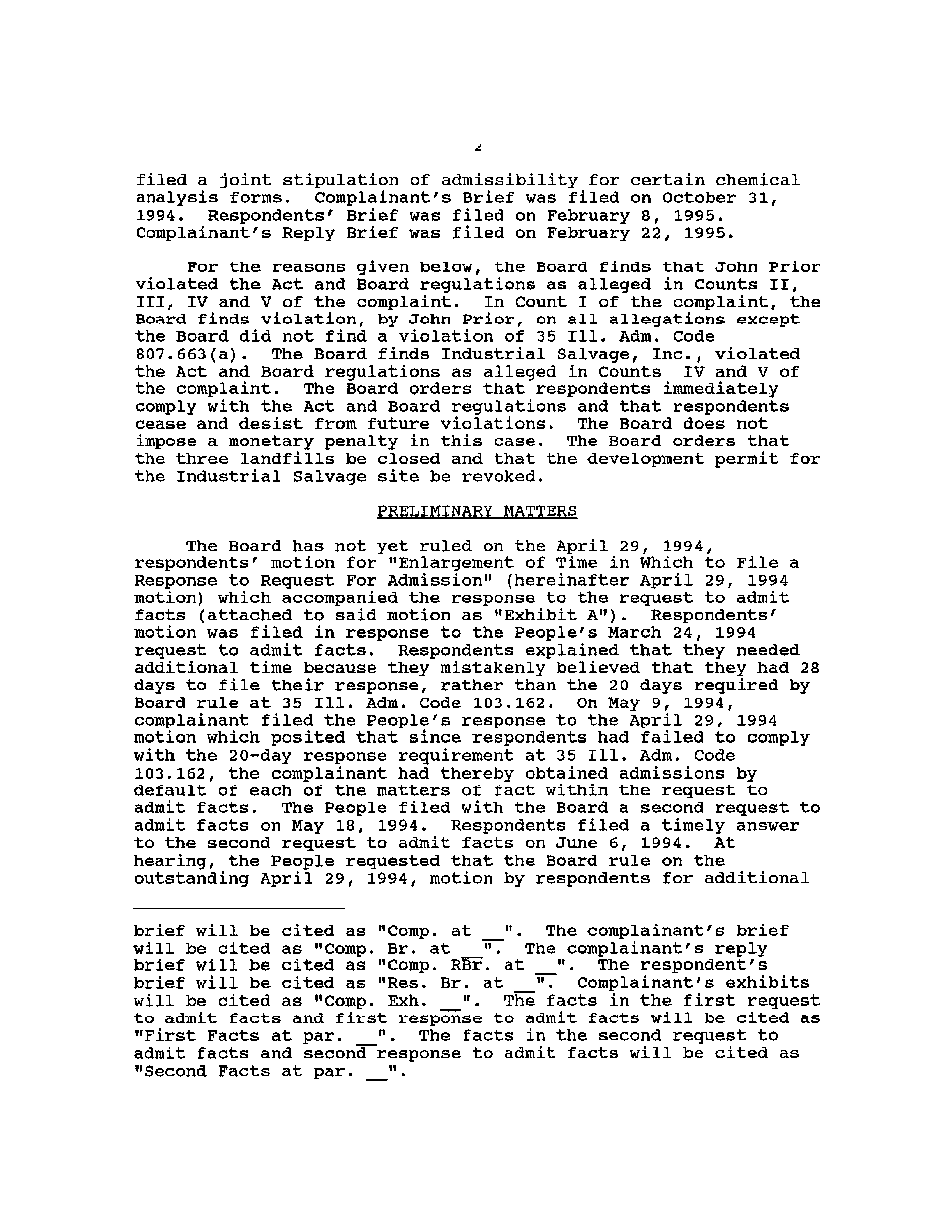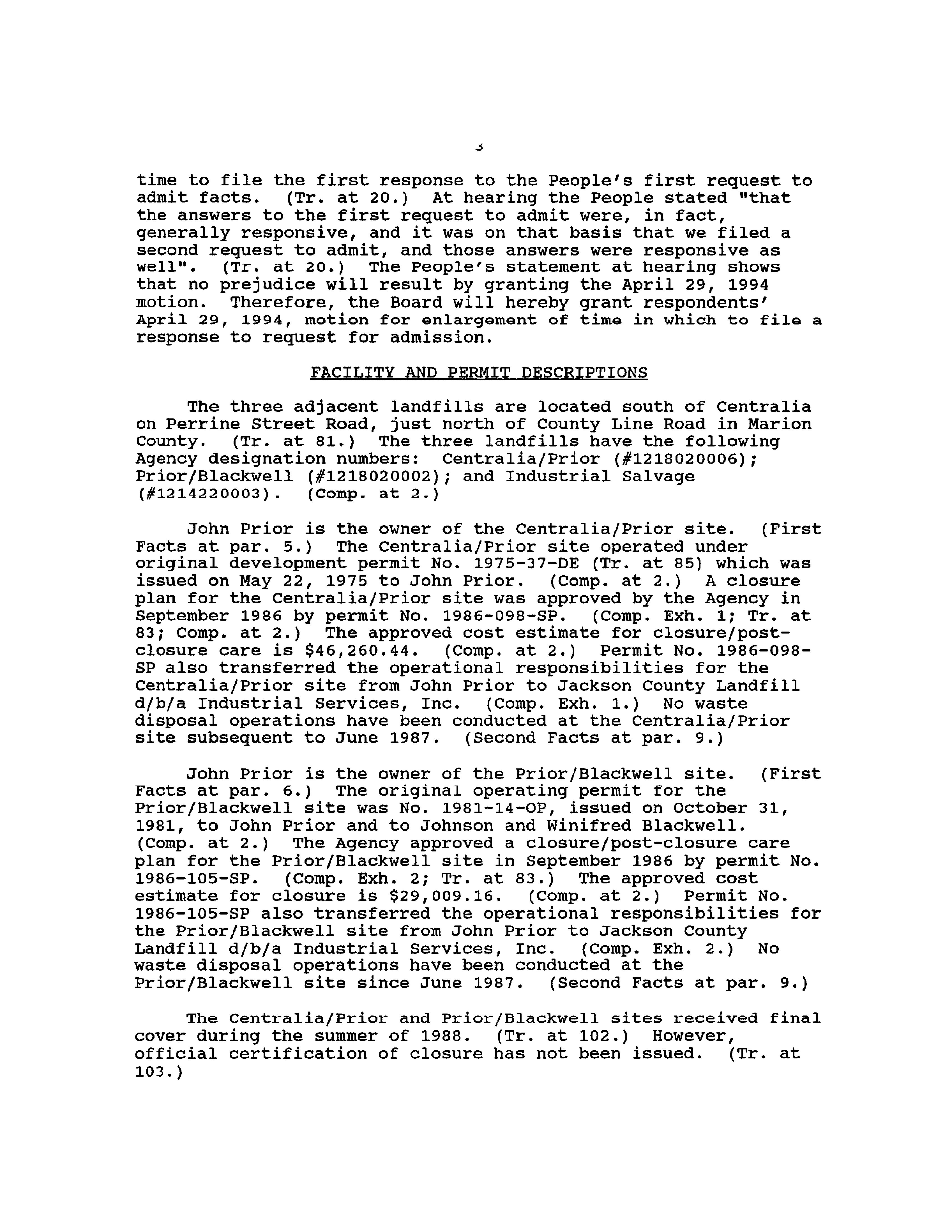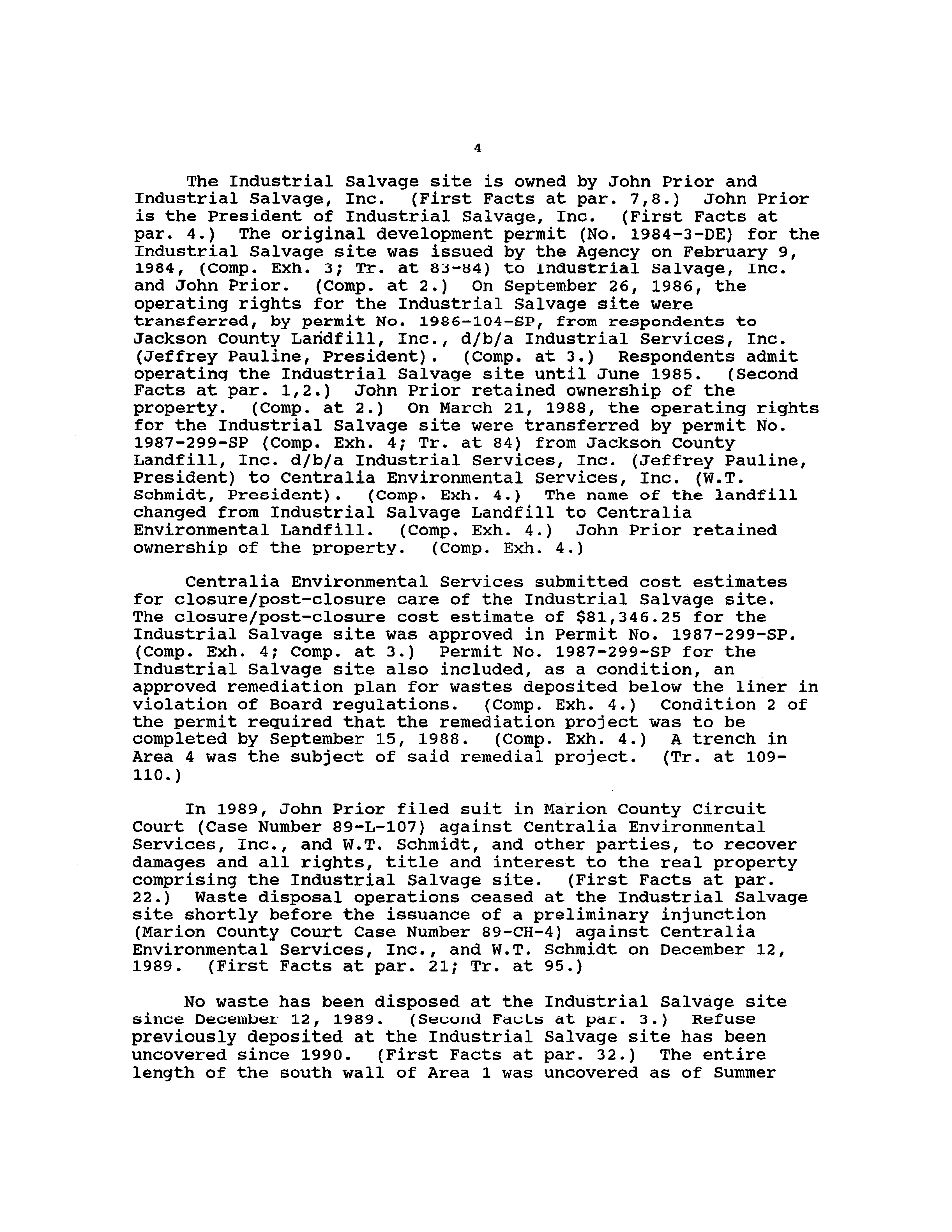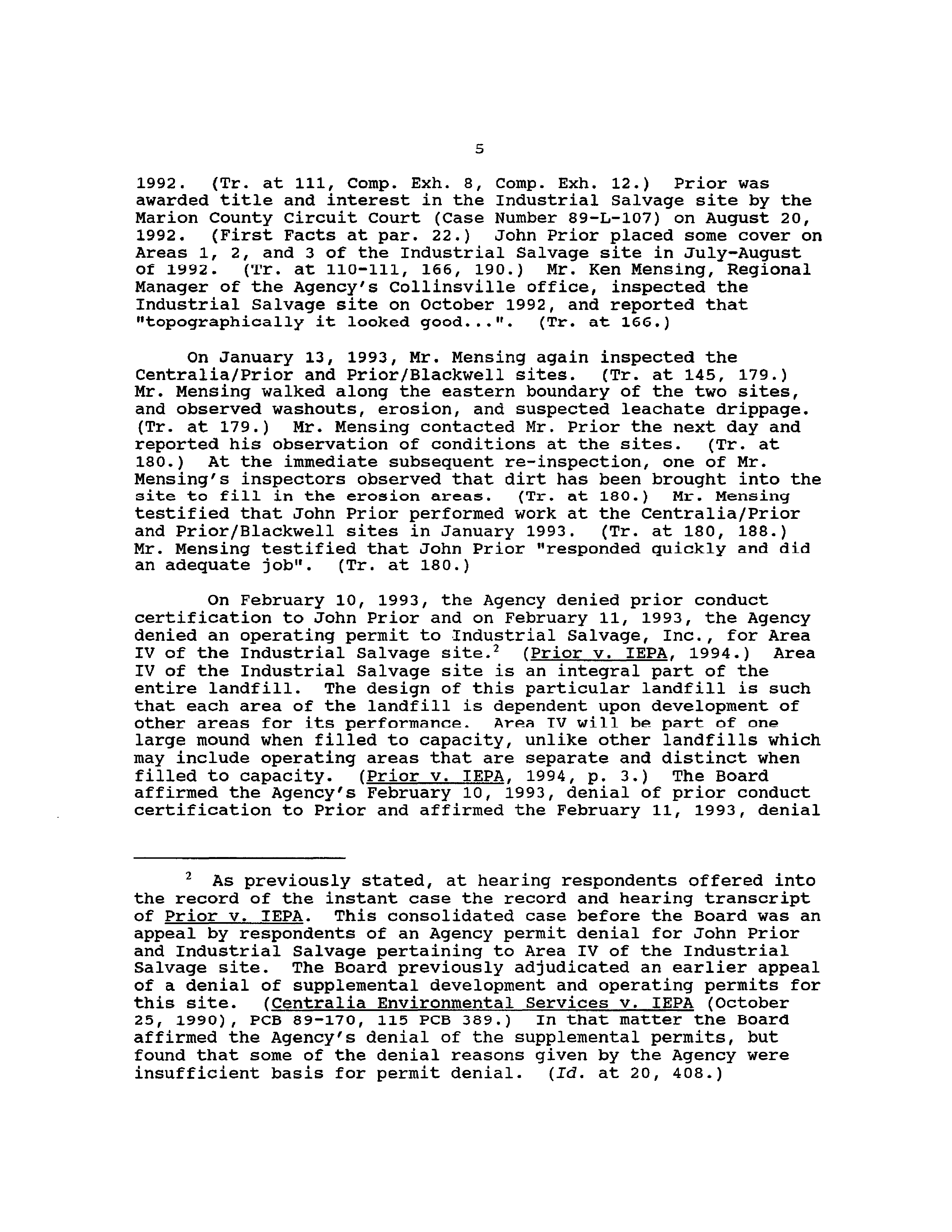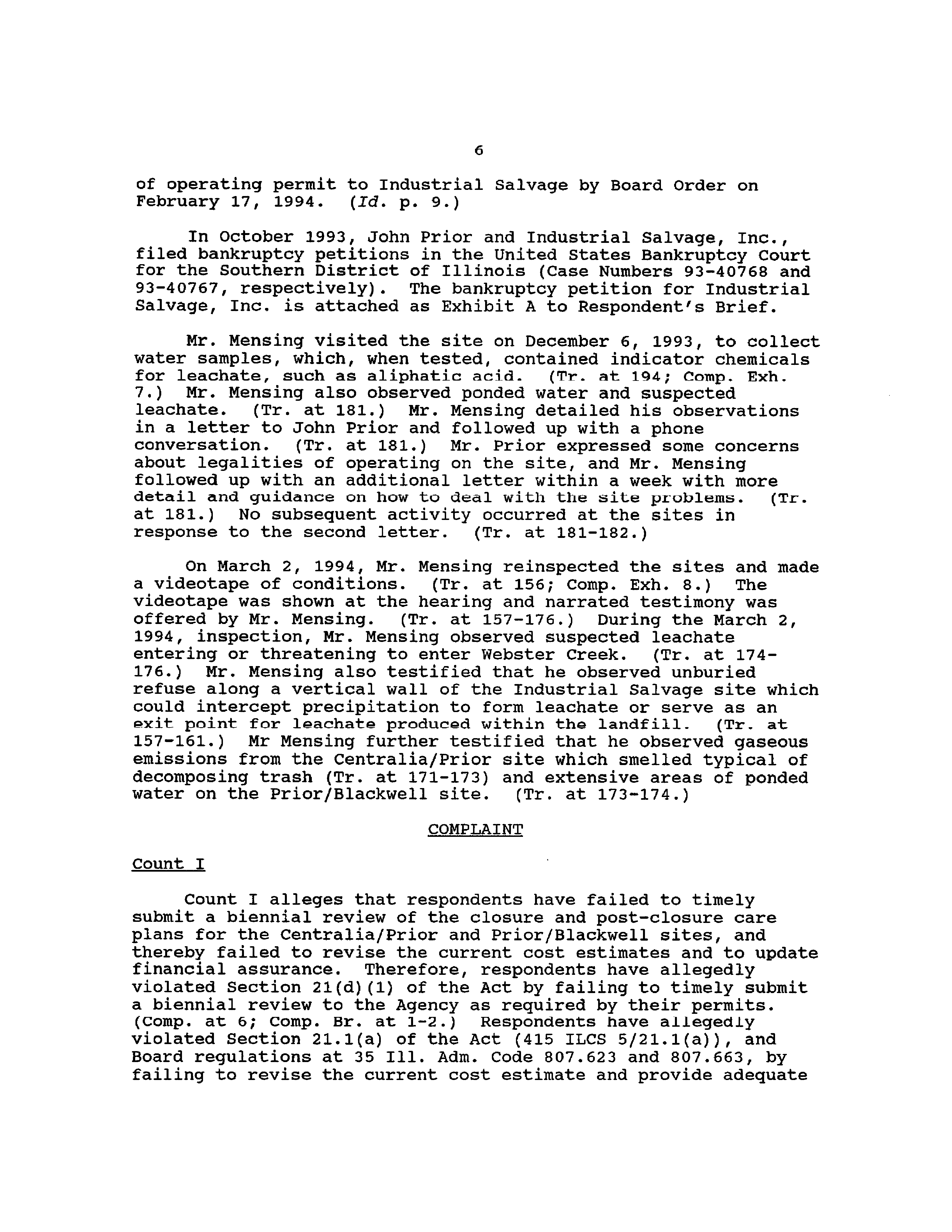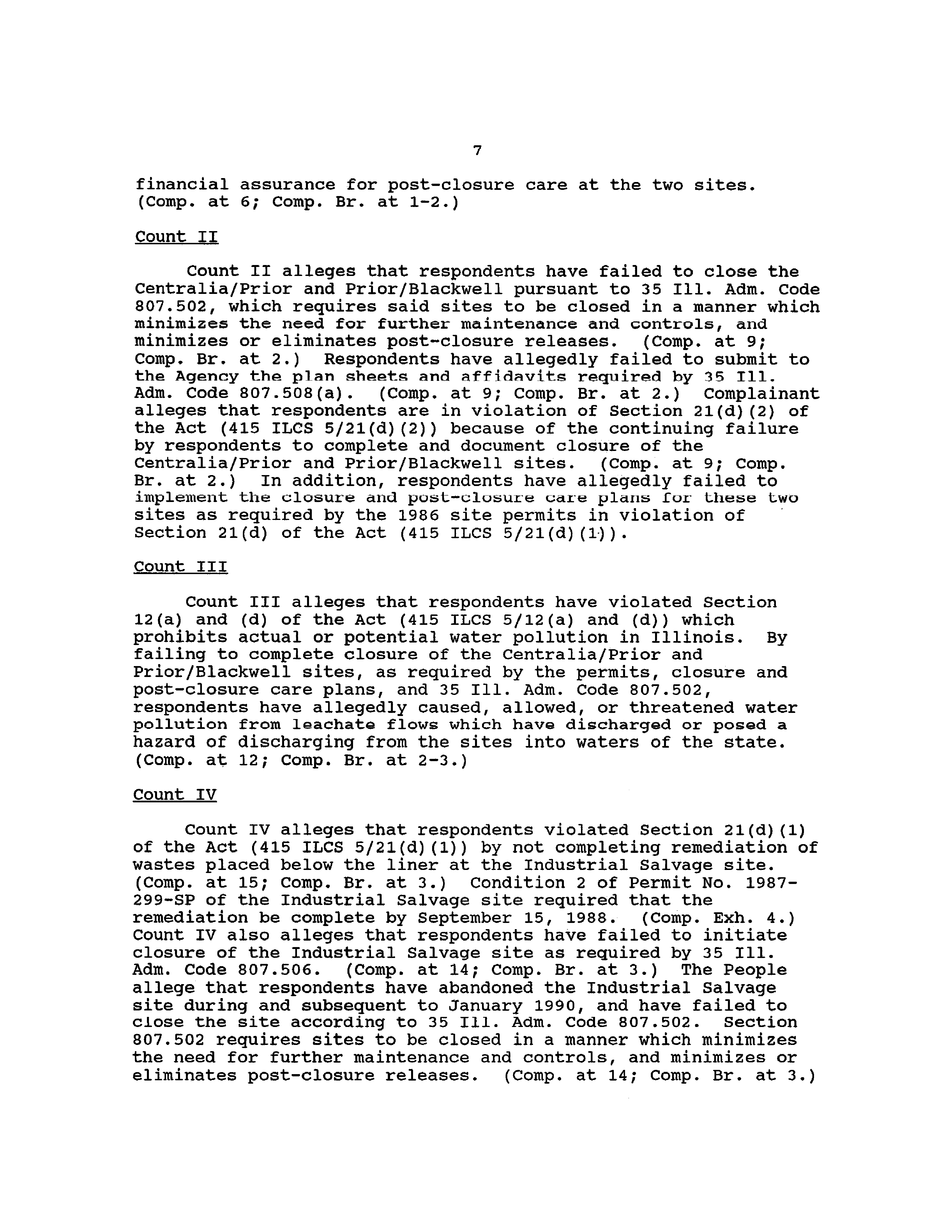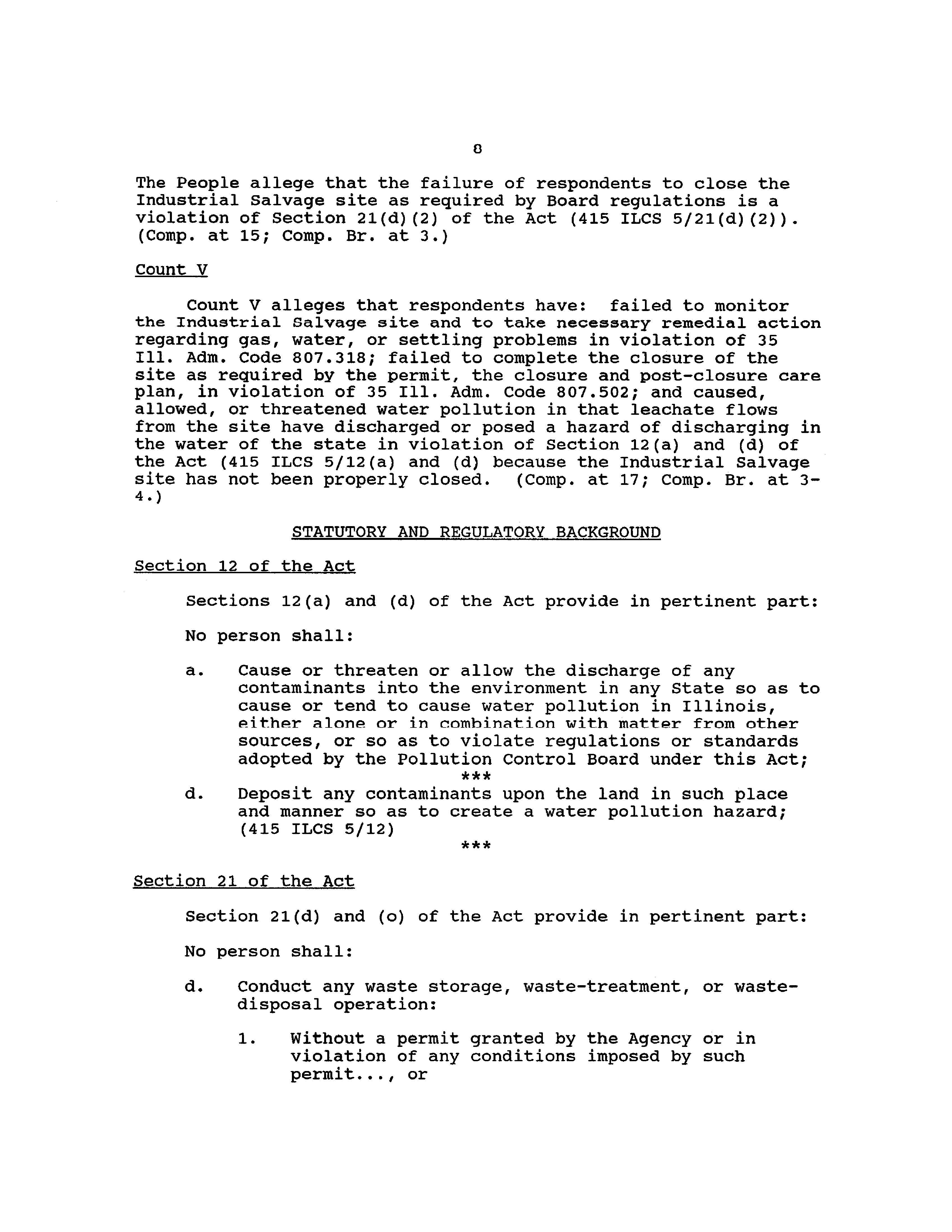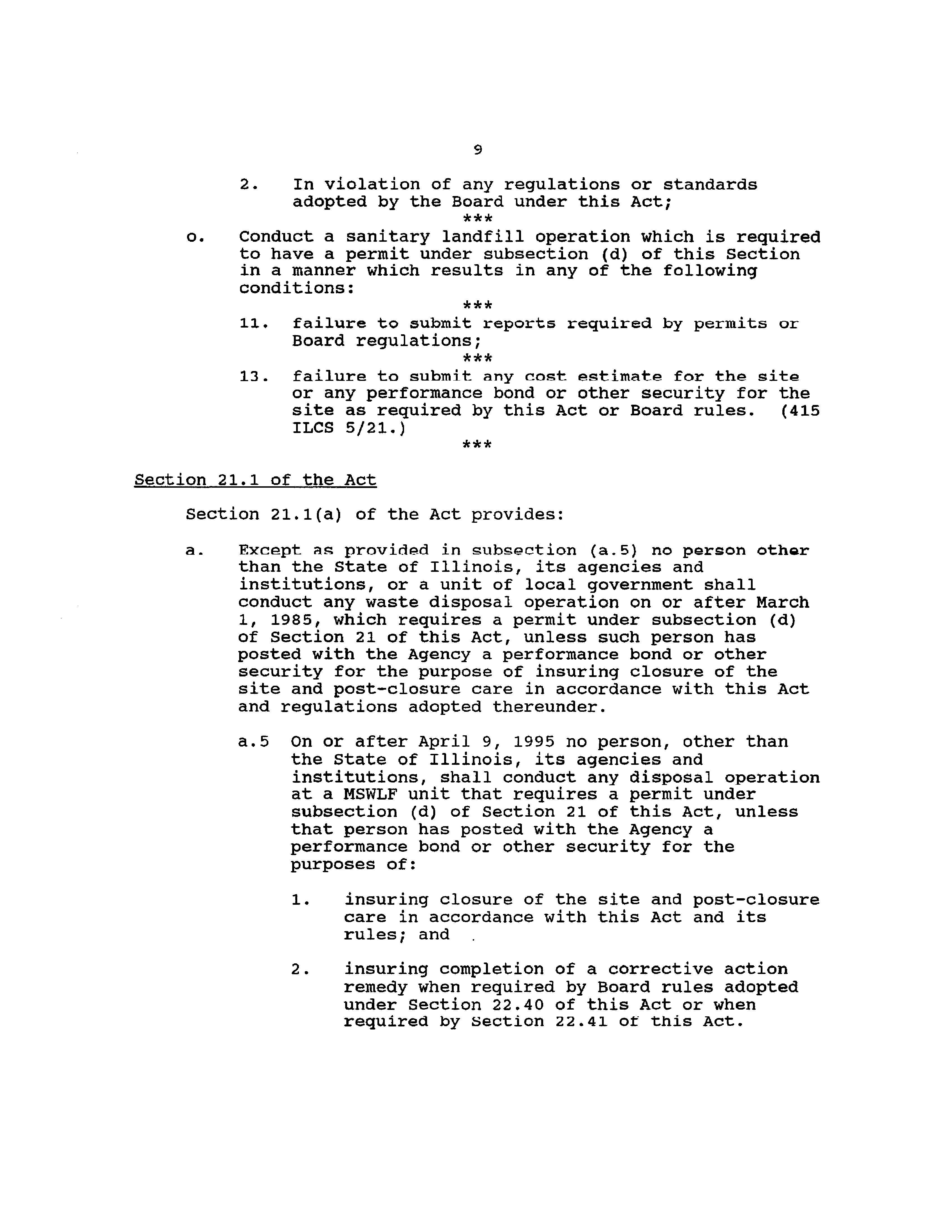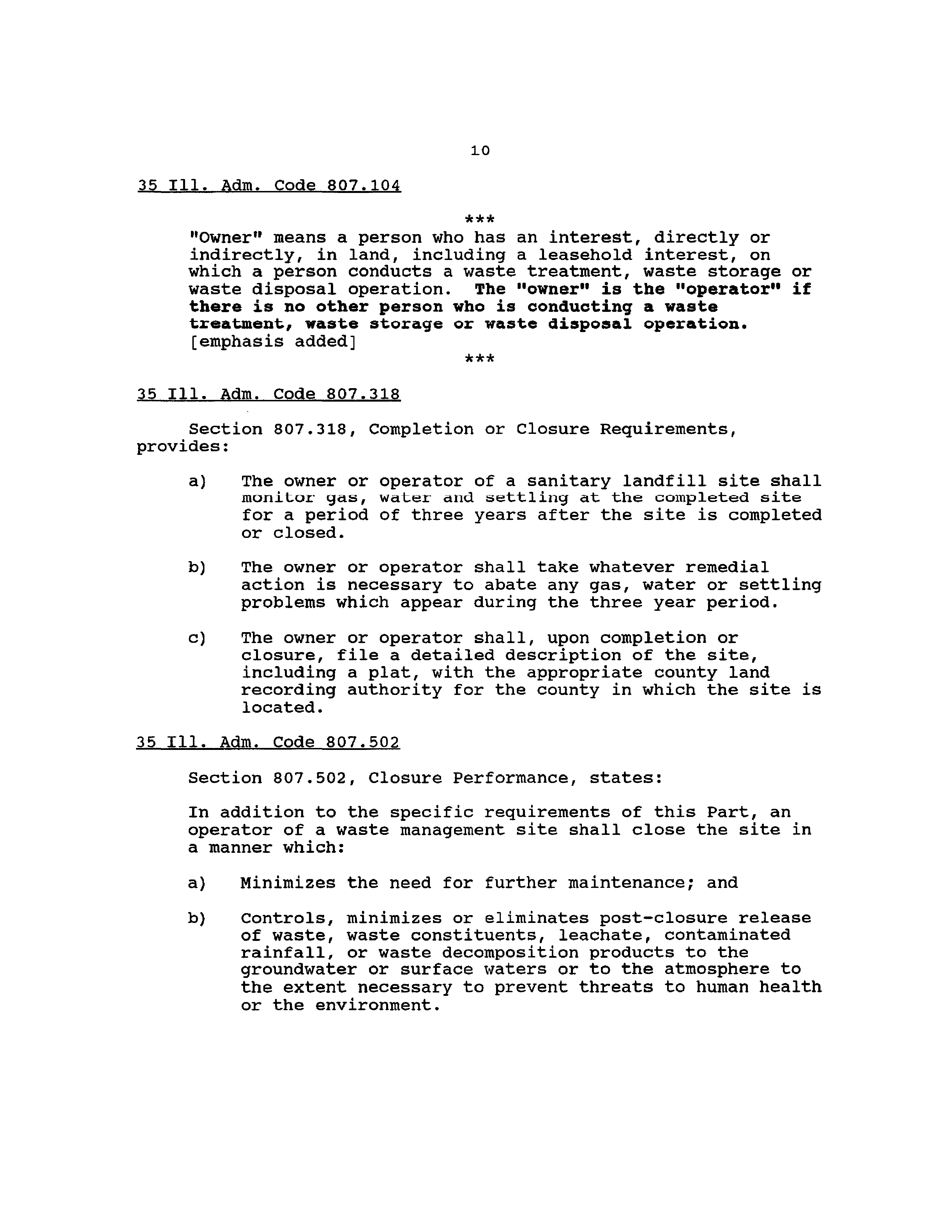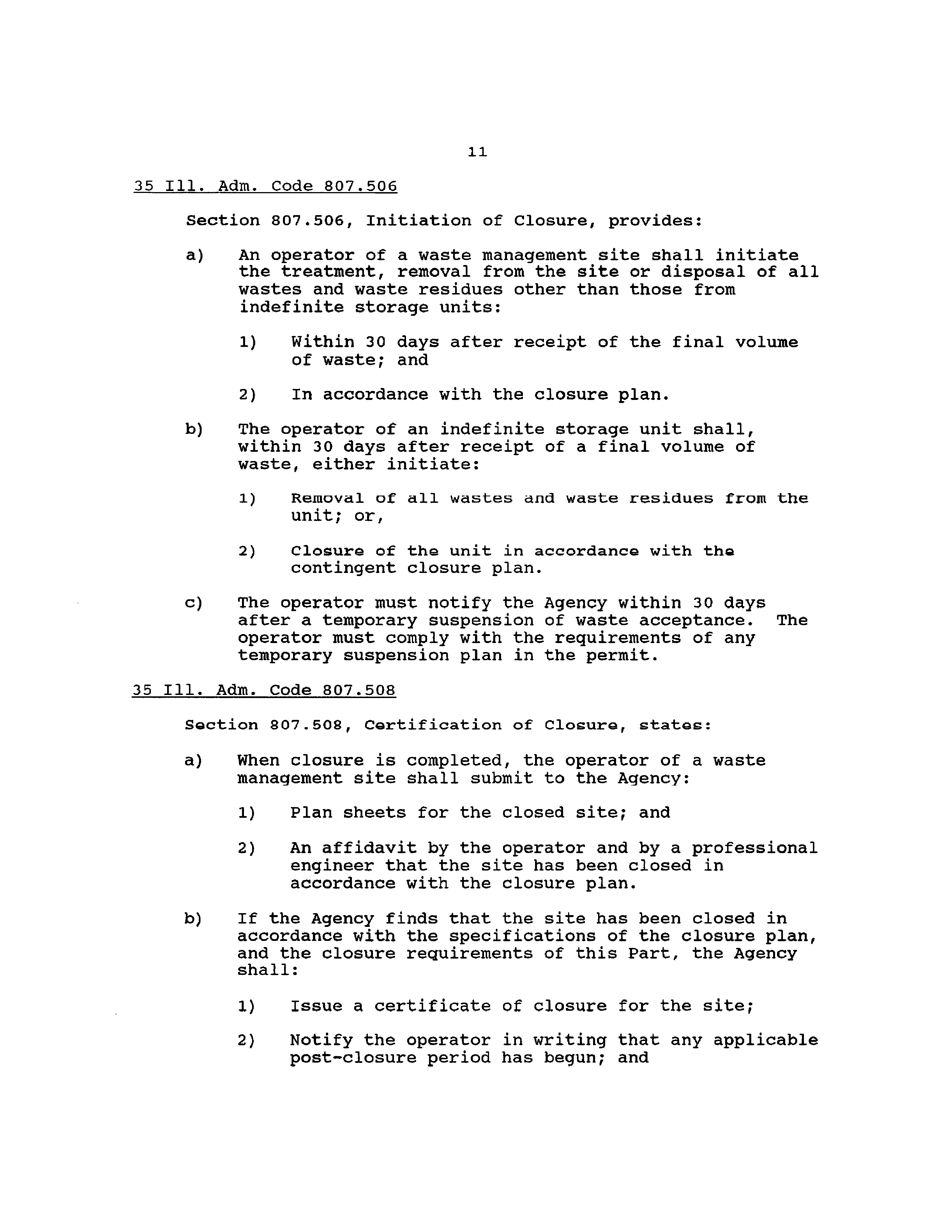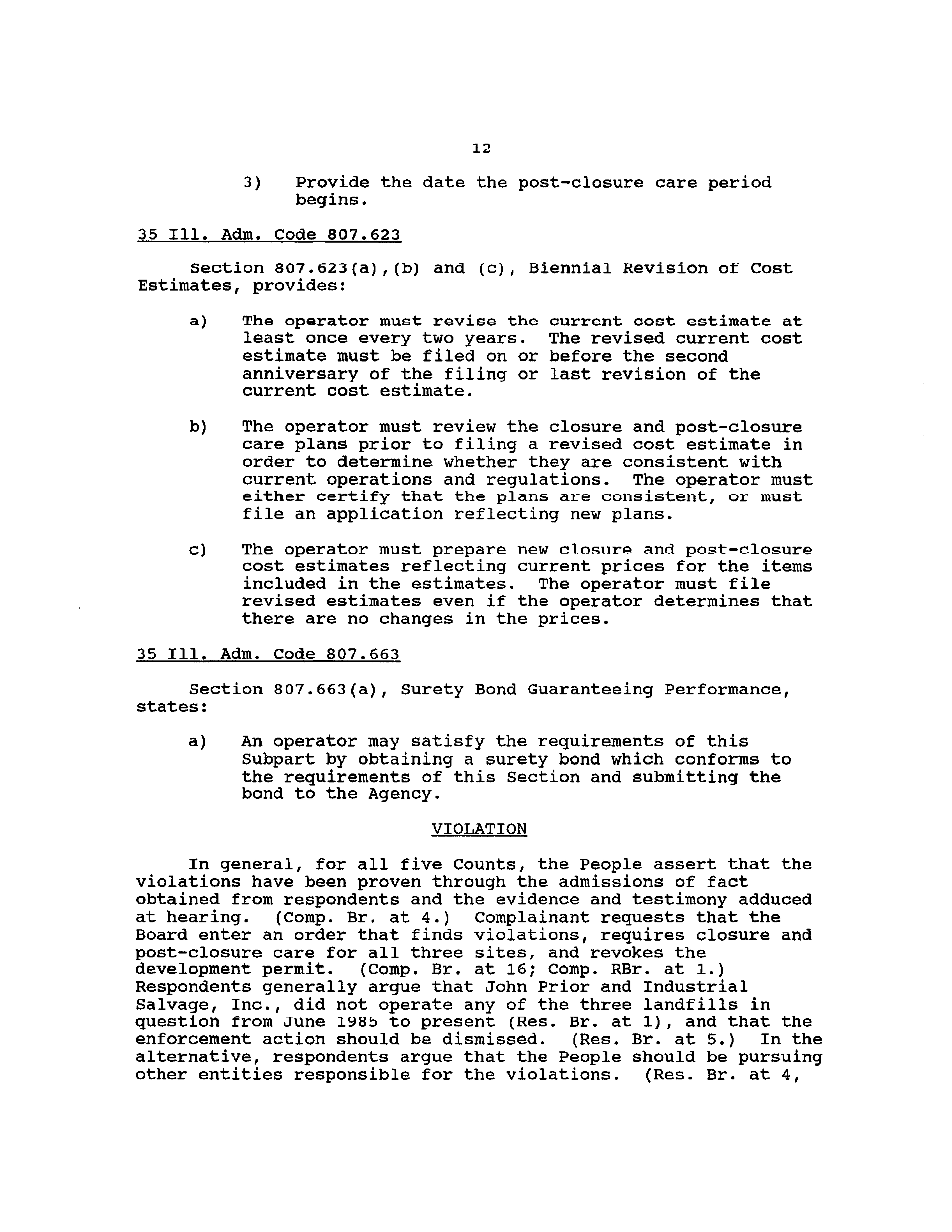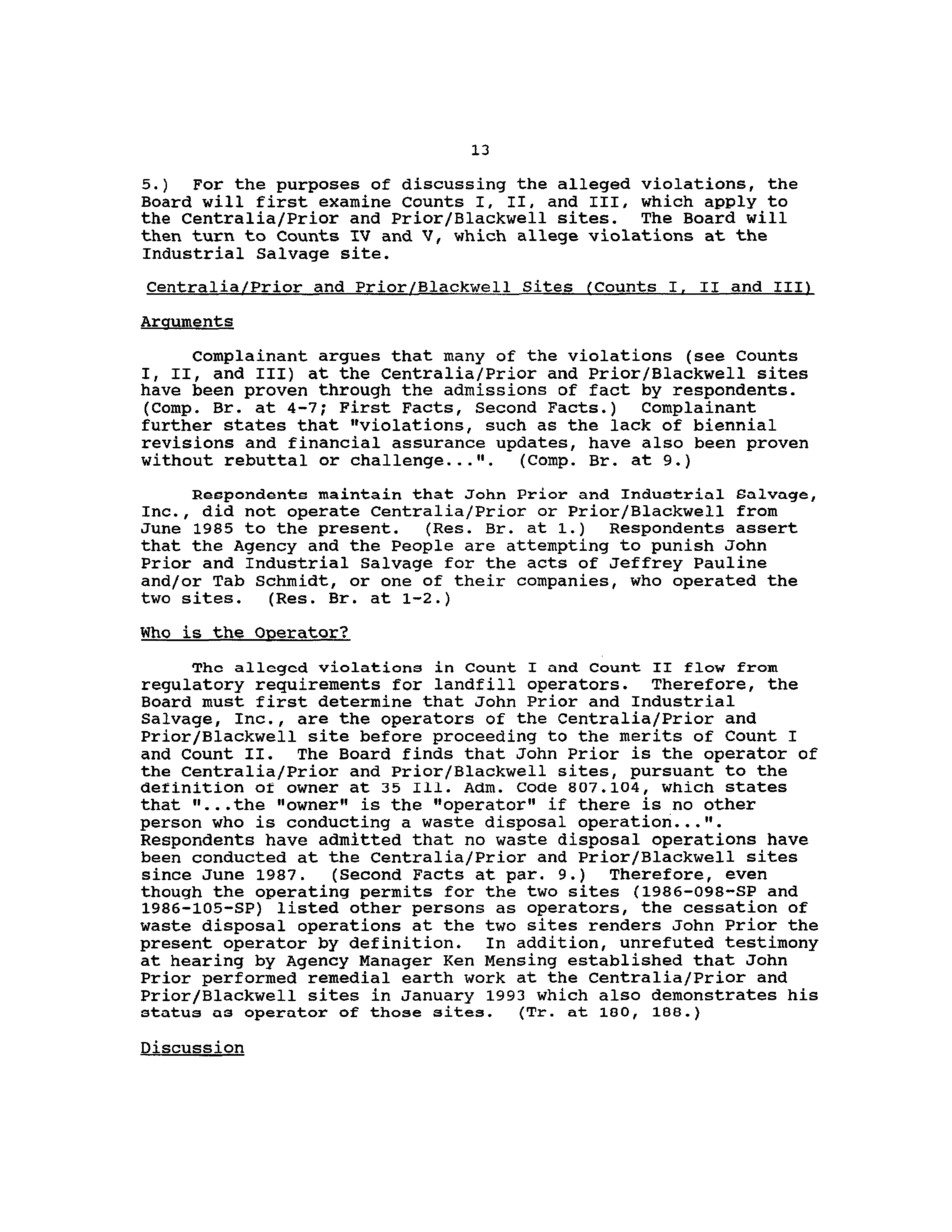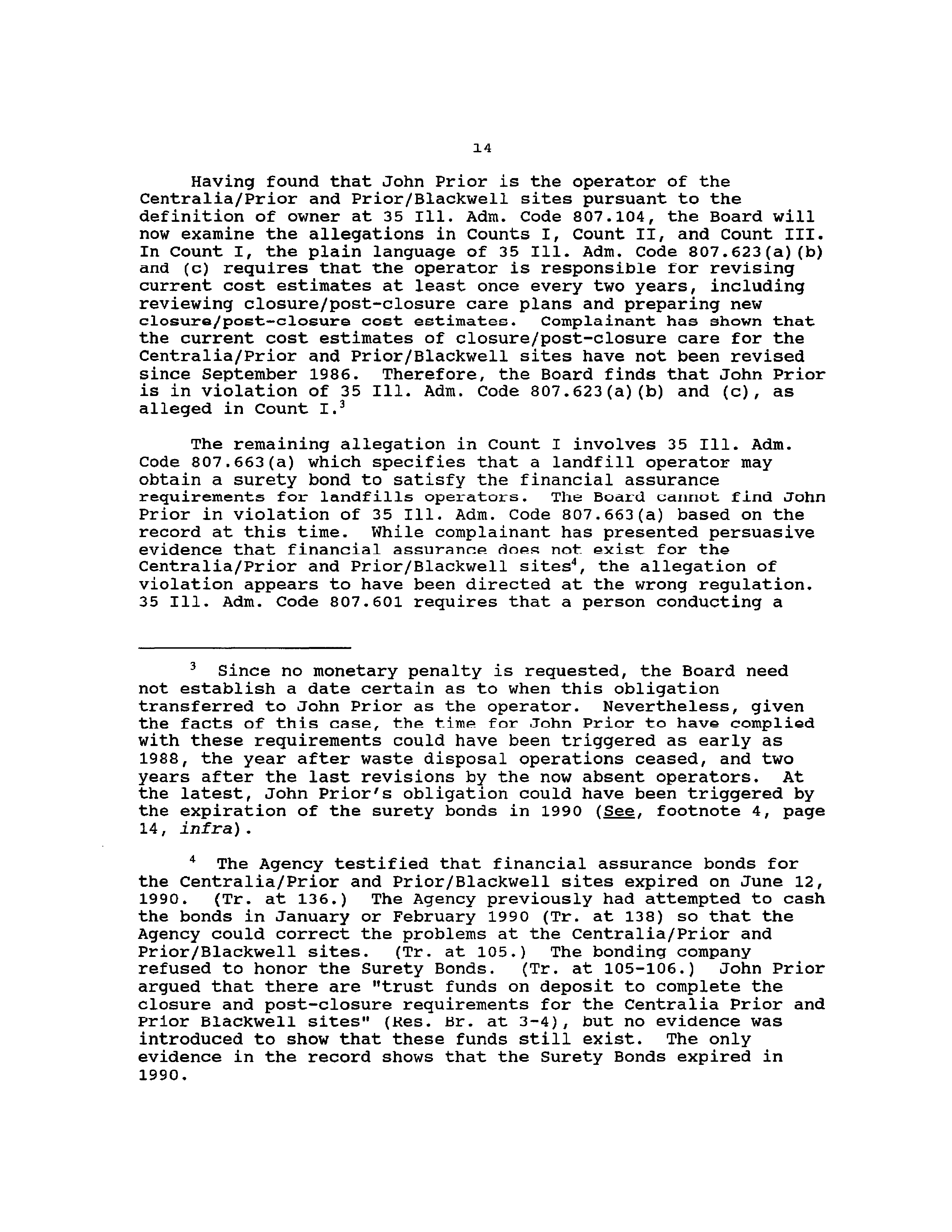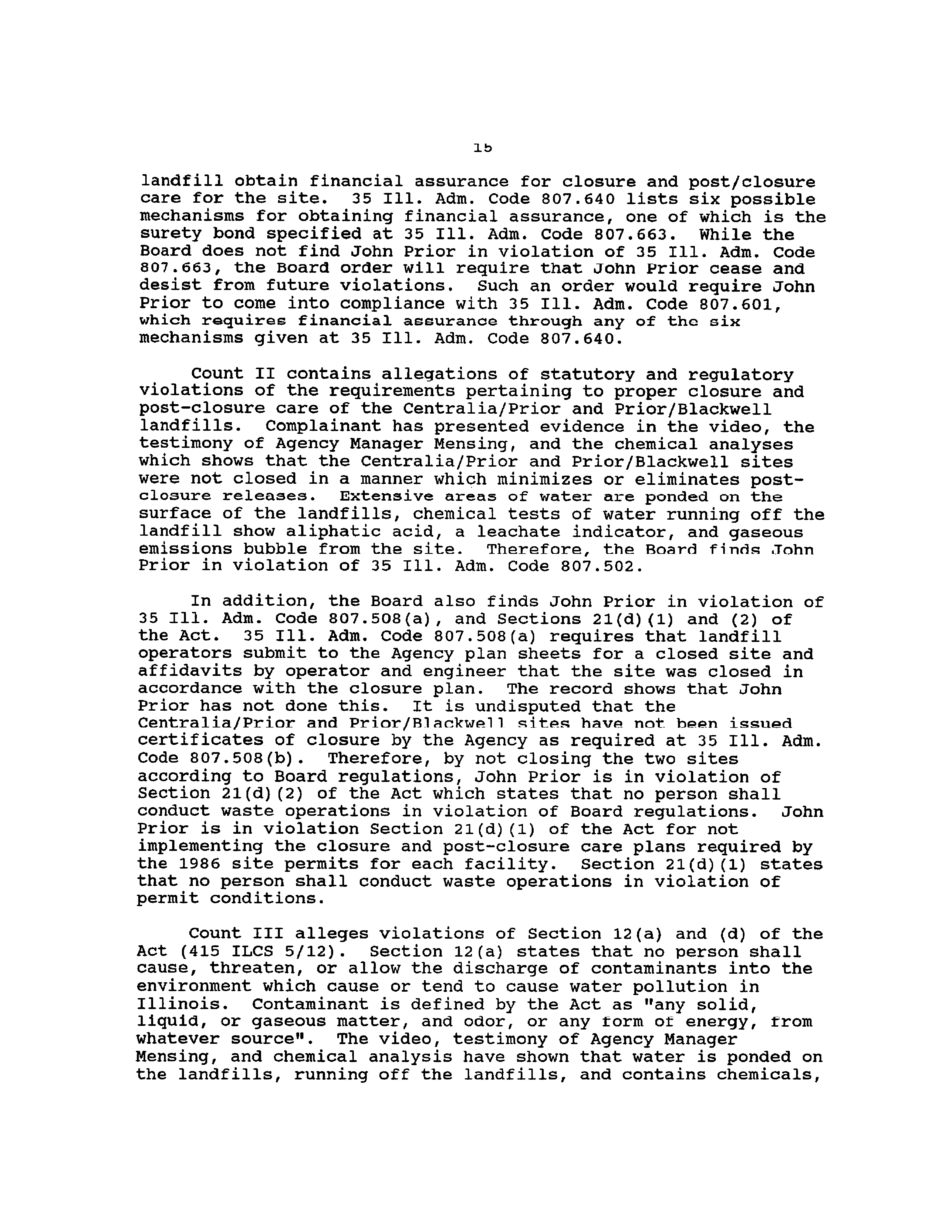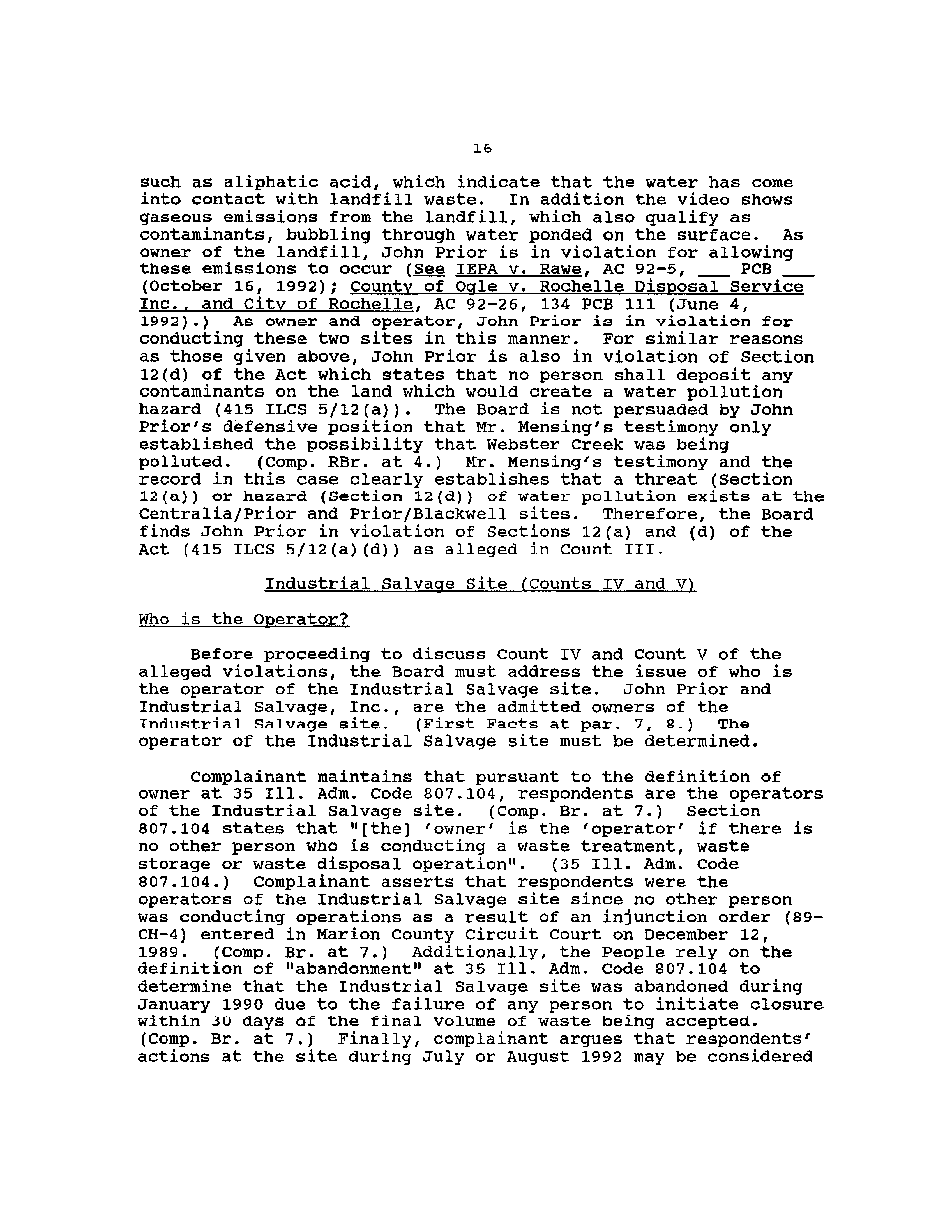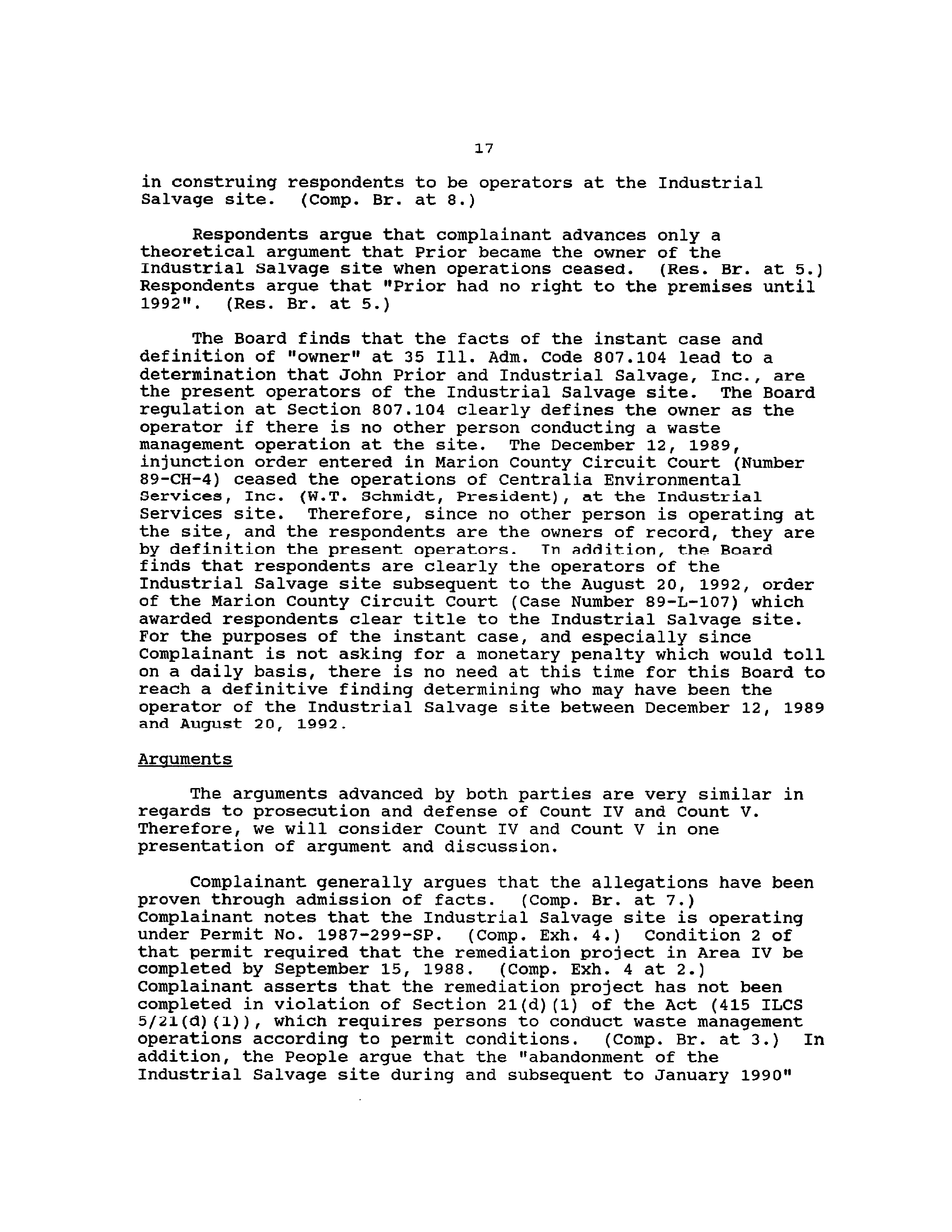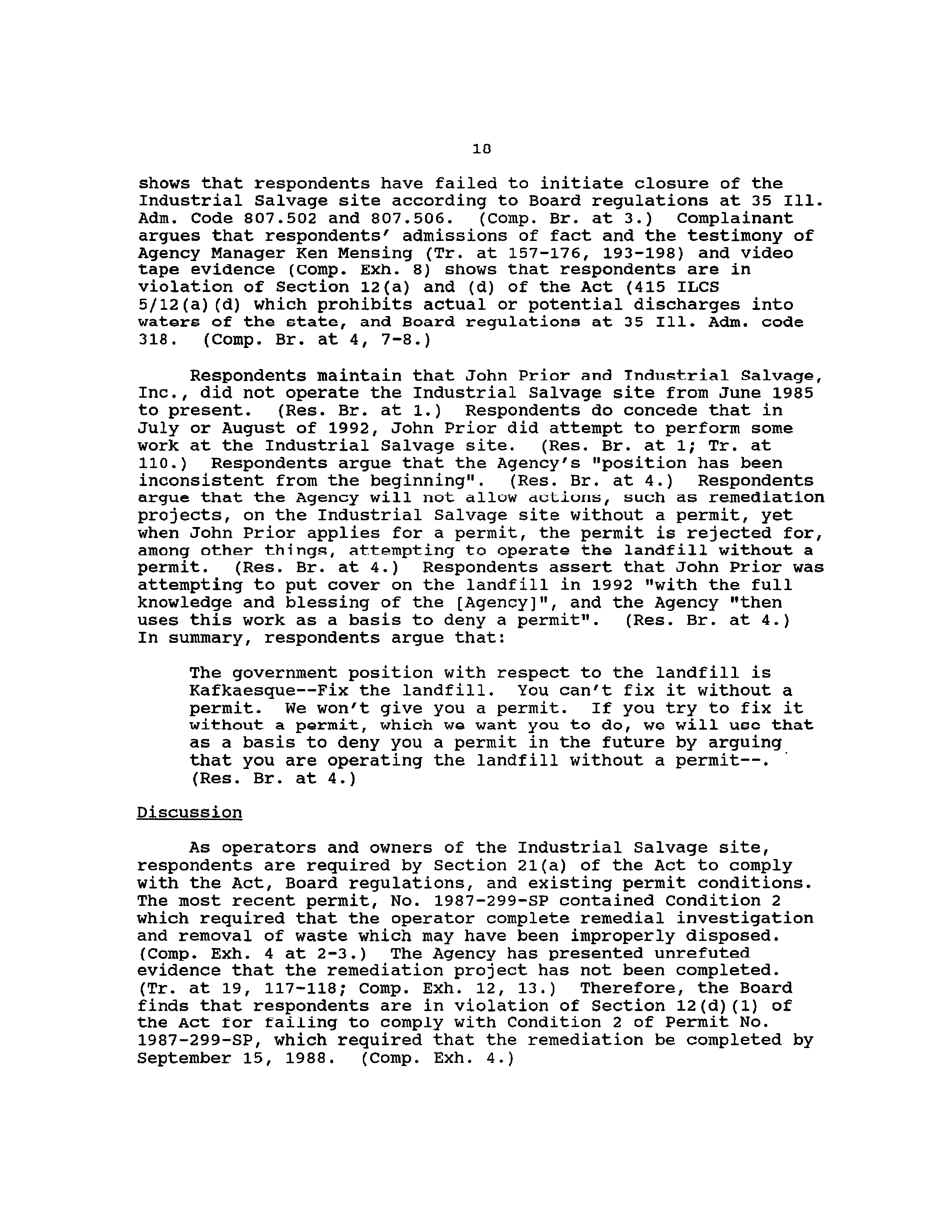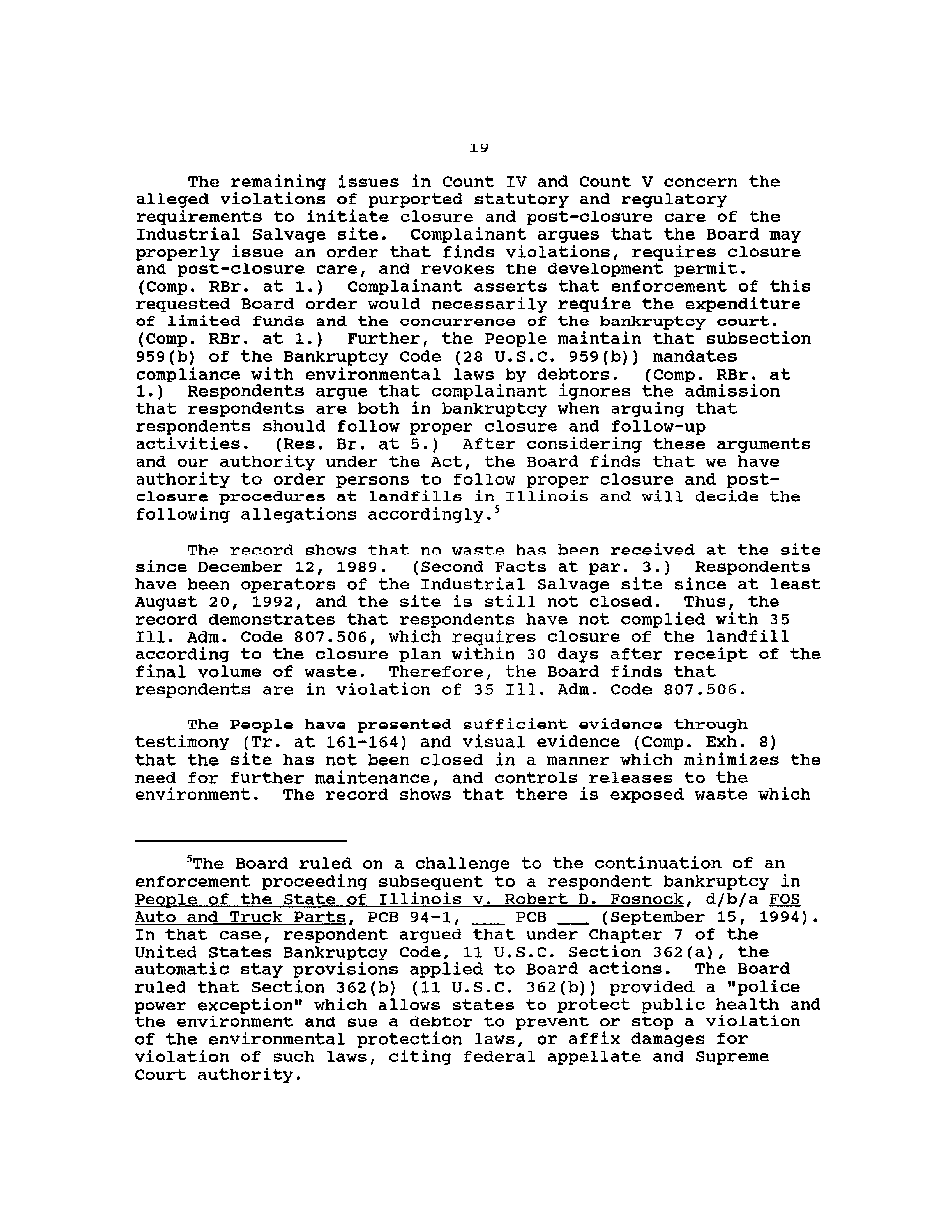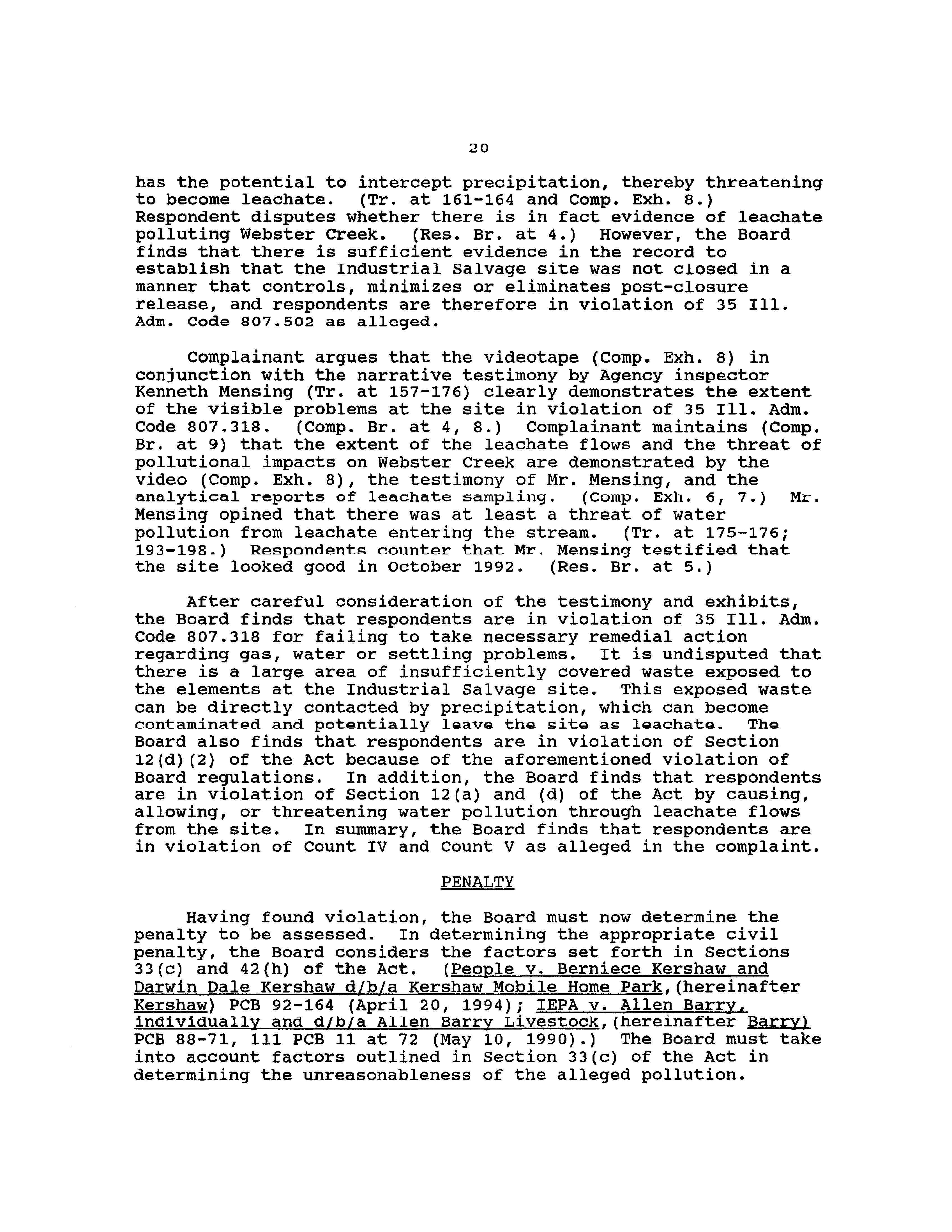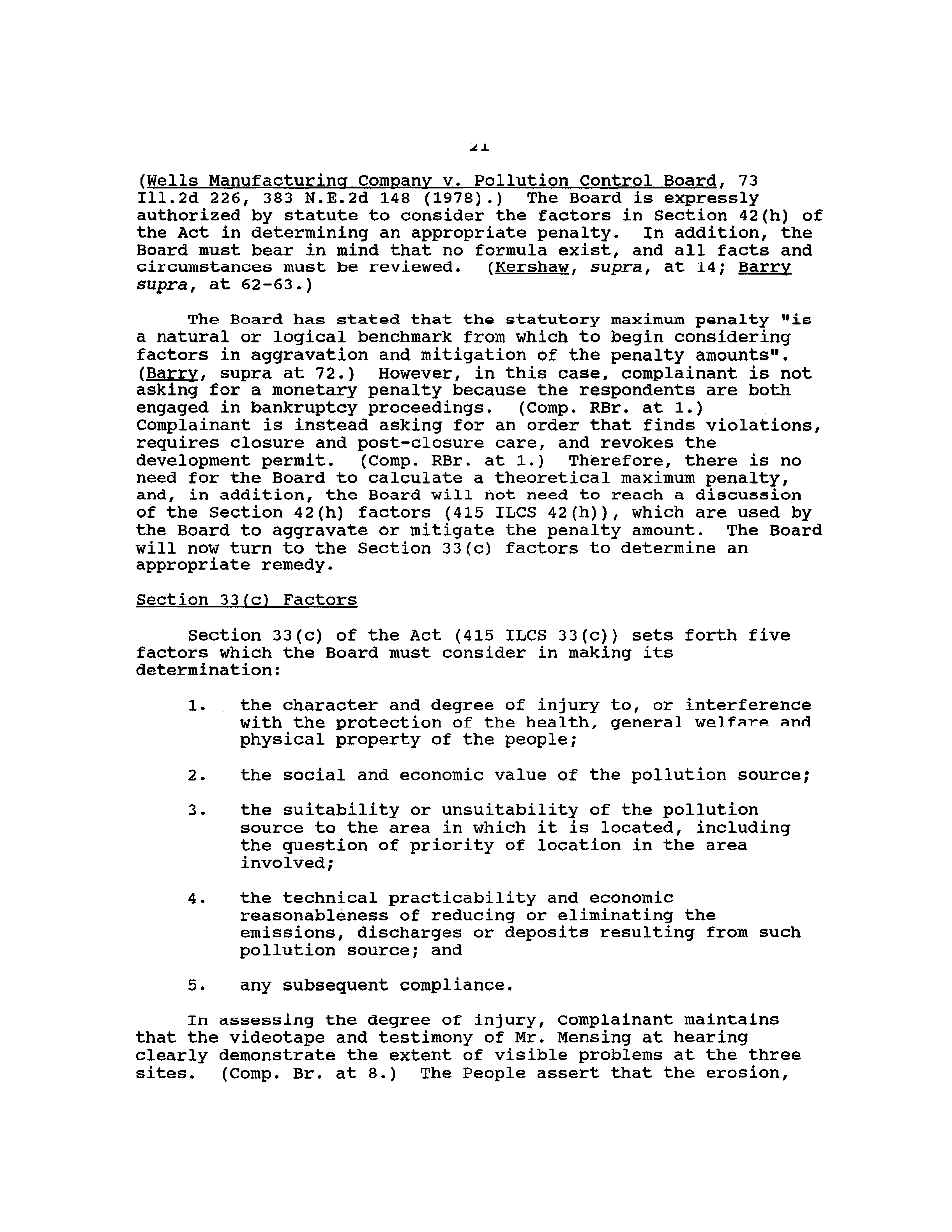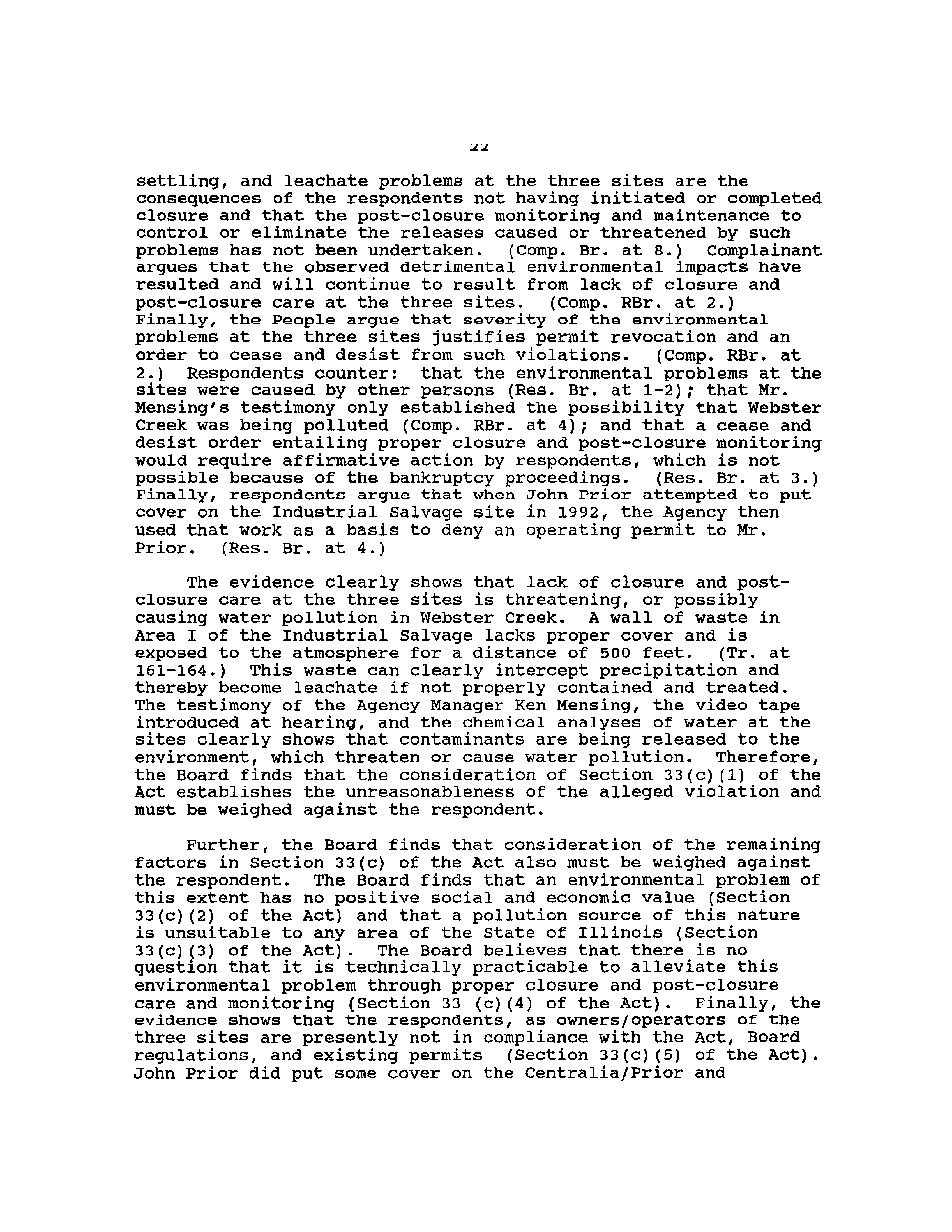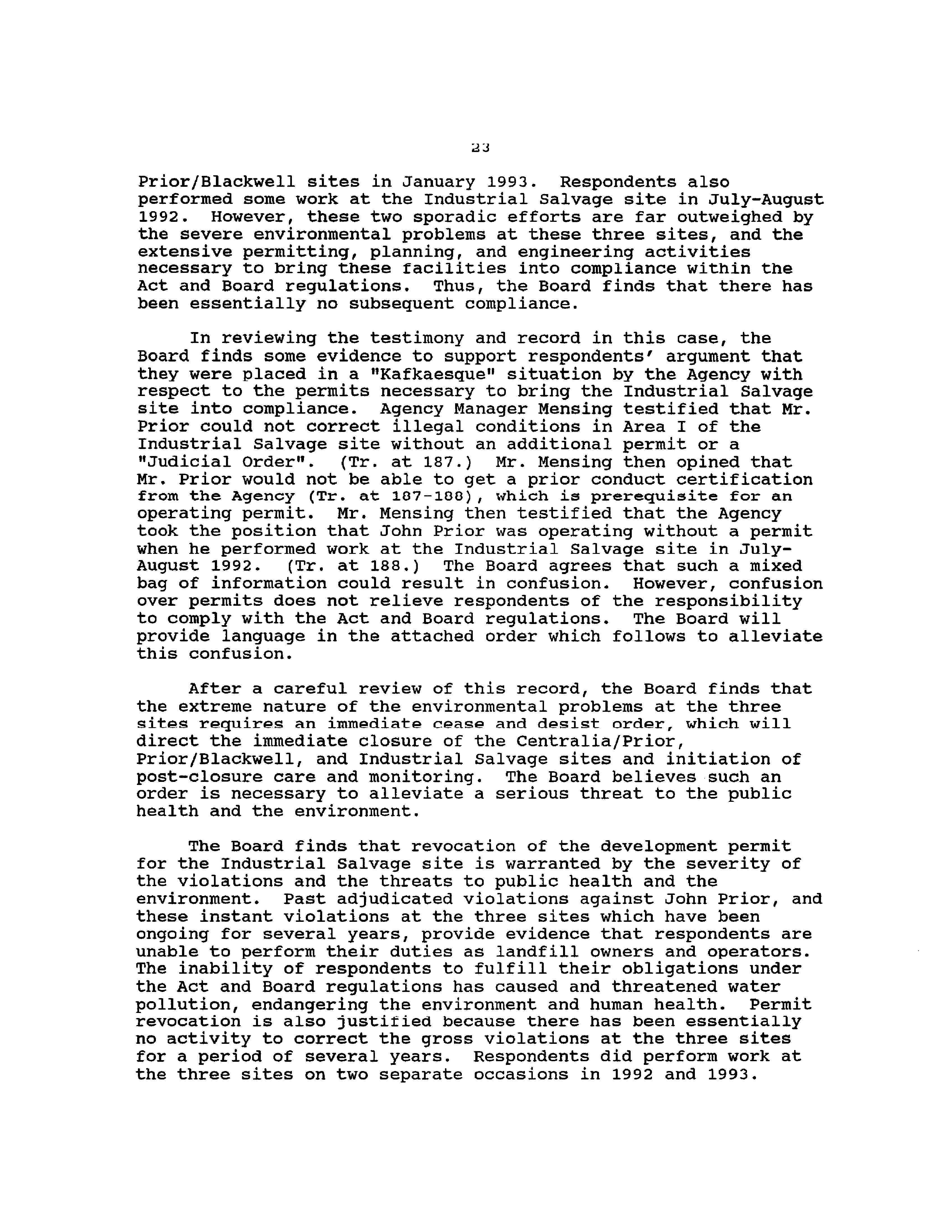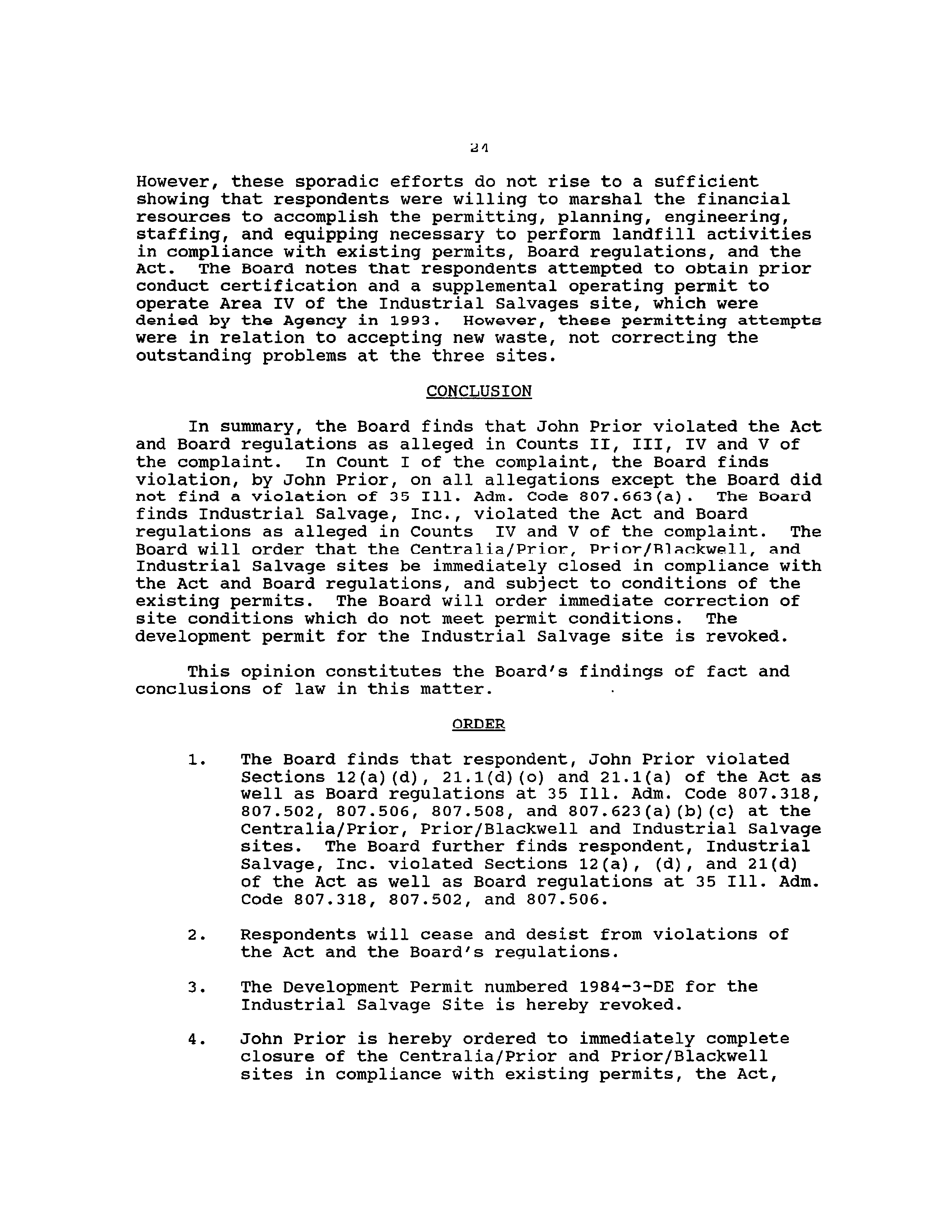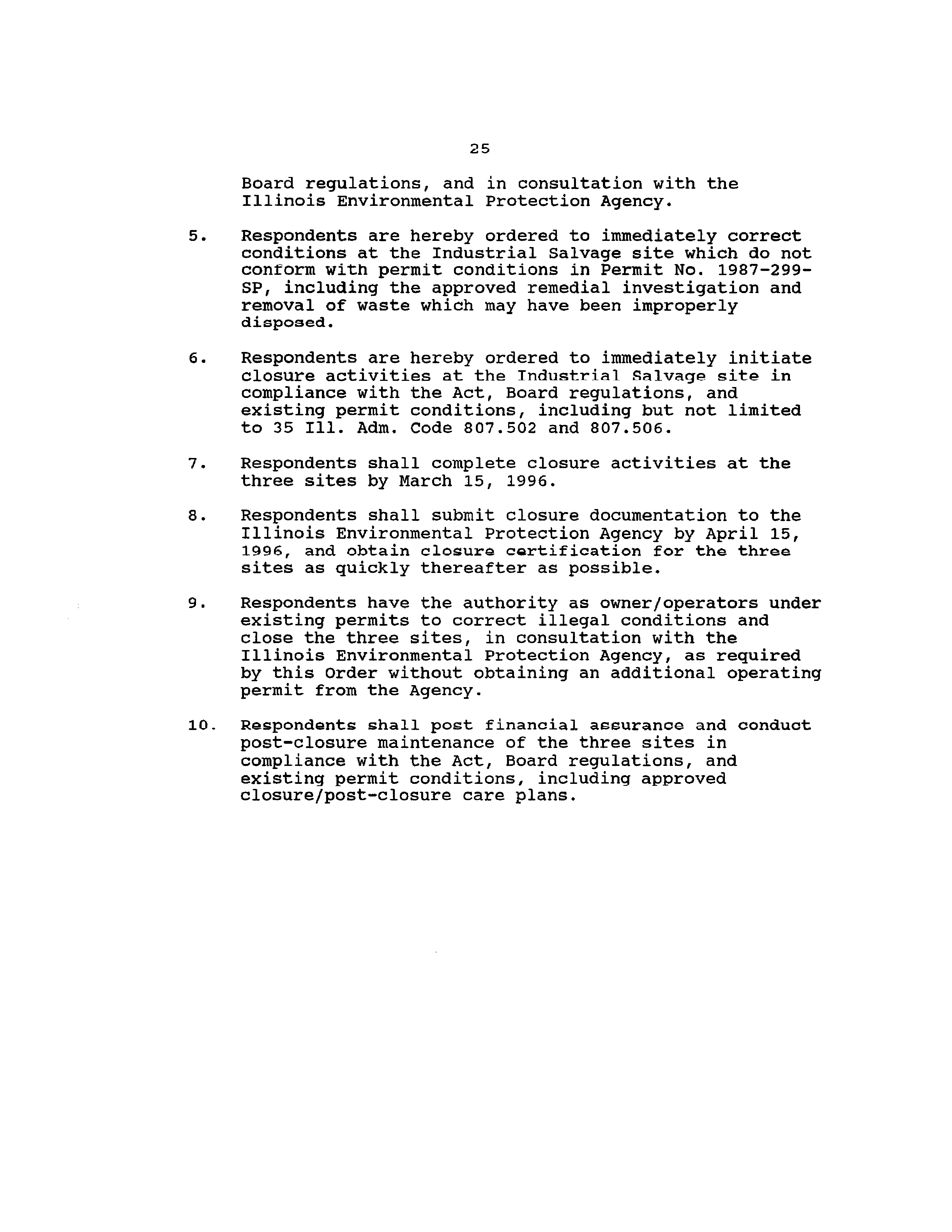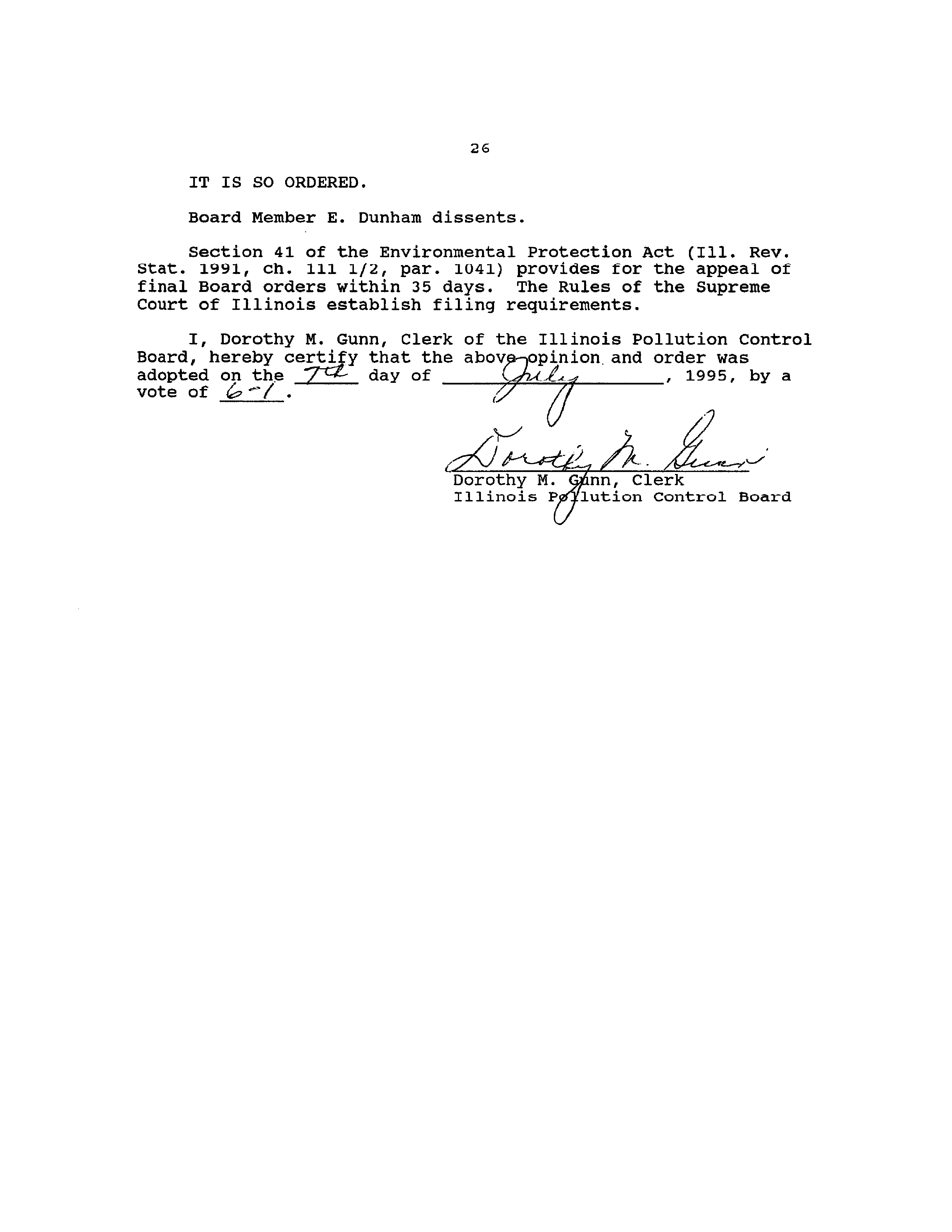ILLINOIS POLLUTION CONTROL BOARD
July 7,
1995
PEOPLE OF THE STATE OF ILLINOIS,)
)
Complainant,
)
v.
)
PCB 93—240
)
(Enforcement-Land)
JOHN
PRIOR
AND
INDUSTRIAL
)
SALVAGE,
INC.,
)
)
Respondents.
THOMAS DAVIS, ASSISTANT ATTORNEY GENERAL, AND JAMES GREG
RICHARDSON, ASSISTANT COUNSEL, ILLINOIS ENVIRONMENTAL PROTECTION
AGENCY, APPEARED ON BEHALF OF COMPLAINANT;
WILLIAM
J.
BECKER, ESQ.,
OF NEIL, ROISTER, VOELKER & ALLEN,
APPEARED
ON BEHALF OF RESPONDENT.
OPINION AND ORDER OF THE BOARD
(by G.
T.
Girard):
This matter comes before the Board on the December 8,
1993,
complaint of the Attorney General, filed on behalf of the People
of the State of Illinois (People or complainant), and at the
request of the Illinois Environmental Protection Agency
(Agency).
The complaint alleges that respondents Industrial Salvage,
Inc.
and John Prior (collectively referred to
as respondents) have
violated Sections 12(a),(d),
21(d),(o) and 21.1(a)
of the
Illinois Environmental Protection Act (Act); and the Board’s
waste disposal regulations in 35
Ill.
Adm. Code 807.318,
807.502,
807.506,
807.508, 8O7.623(a)(b)(c), and 807.663(a)
at three
landfills.
The landfills are located on three adjacent
properties near Centralia, Marion County, Illinois, and are known
as the Centralia/Prior site, the Prior/Blackwell site, and the
Industrial Salvage site.
The People’s complaint details the
violations in five counts described below.
Hearing is mandatory pursuant to Section 33 of the Act and
was held on August 29,
1994, before Board Hearing Officer John
Hudspeth.
Members of the public were in attendance, and one
public member presented testimony.
At hearing, respondents
offered into the record of the instant case,
the record and
hearing transcript of a previous Board case PCB 93-60 and PCB 93-
61 (Industrial Salvage,
Inc.
and John Prior v. Illinois
Environmental Protection Agency, PCB 93-60, PCB 93-61,
Consl.,
—
PCI3
(February 1,
1994) herein after cited as Prior v.
IEPA).
(Tr. at 206—207.)’
On September 12,
1994,
the parties
The hearing transcript will be cited as
“Tr.
at
“.
The
complaint will be cited as
“Comp.
at
_“.
The complainant’s
4
filed a joint stipulation of admissibility for certain chemical
analysis forms.
Complainant’s Brief was filed on October 31,
1994.
Respondents’ Brief was filed on February 8,
1995.
Complainant’s Reply Brief was filed on February 22,
1995.
For the reasons given below, the Board finds that John Prior
violated the Act and Board regulations as alleged in Counts II,
III,
IV and V of the complaint.
In Count
I of the complaint,
the
Board finds violation,
by John Prior, on all allegations except
the Board did not find a violation of
35 Ill. Adm. Code
807.663(a).
The Board finds Industrial Salvage,
Inc., violated
the Act and Board regulations as alleged in Counts
IV and
V
of
the complaint.
The Board orders that respondents immediately
comply with the Act and Board regulations and that respondents
cease and desist from future violations.
The Board does not
impose a monetary penalty in this case.
The Board orders that
the three landfills be closed and that the development permit for
the Industrial Salvage site be revoked.
PRELIMINARY MATTERS
The Board has not yet ruled on the April 29,
1994,
respondents’ motion for “Enlargement of Time in Which to File a
Response to Request For Admission”
(hereinafter April
29, 1994
motion) which accompanied the response to the request to admit
facts
(attached to said motion as “Exhibit A”).
Respondents’
motion was filed in response to the People’s March
24, 1994
request to admit facts.
Respondents explained that they needed
additional time because they mistakenly believed that they had 28
days to file their response, rather than the 20 days required by
Board rule at 35 Ill. Adm. Code 103.162.
On May
9,
1994,
complainant filed the People’s response to the April
29, 1994
motion which posited that since respondents had failed to comply
with the 20-day response requirement at
35 Ill. Adm.
Code
103.162, the complainant had thereby obtained admissions
by
default of each of the matters of tact within the request to
admit facts.
The People filed with the Board a second request to
admit facts on May 18,
1994.
Respondents filed a timely answer
to the second request to admit facts on June 6,
1994.
At
hearing, the People requested that the Board rule on the
outstanding April
29,
1994, motion by respondents for additional
brief will be cited as
“Coinp.
at
_“.
The complainant’s brief
will be cited as “Comp.
Br.
at
“.
The complainant’s reply
brief will be cited as “Comp. R~f. at
“.
The respondent’s
brief will be cited as “Res.
Br.
at
“.
Complainant’s exhibits
will be cited as “Comp.
Exh.
“.
The facts in the first request
to admit facts and first response to admit facts will be cited as
“First Facts at par.
“.
The facts in the second request to
admit facts and second response to admit facts will be cited as
“Second Facts at par.
“.
-s
time to file the first response to the People’s first request to
admit facts.
(Pr. at 20.)
At hearing the People stated “that
the answers to the first request to admit were,
in fact,
generally responsive, and it was on that basis that we filed a
second request to admit, and those answers were responsive as
well”.
(Tr.
at 20.)
The People’s statement at hearing shows
that no prejudice will result by granting the April 29,
1994
motion.
Therefore,
the Board will hereby grant respondents’
April 29,
1994, motion
for enlargement of time
in which to file
a
response to request for admission.
FACILITY
AND
PERMIT
DESCRIPTIONS
The three adjacent landfills are located south of Centralia
on Perrine Street Road,
just north of County Line Road in Marion
County.
(Tr. at 81.)
The three landfills have the following
Agency designation numbers:
Centralia/Prior
(#1218020006);
Prior/Blackwell
(#1218020002); and Industrial Salvage
(#1214220003).
(Comp.
at 2.)
John Prior is the owner of the Centralia/Prior site.
(First
Facts
at
par.
5.)
The
Centralia/Prior
site
operated
under
original development permit No.
1975-37-DE
(Tr. at 85) which was
issued on May 22, 1975 to John Prior.
(Comp. at
2.)
A closure
plan for the Centralia/Prior site was approved by the Agency in
September 1986 by permit No.
l986-098-SP.
(Comp.
Exh.
1;
Pr.
at
83; Comp.
at 2.)
The approved cost estimate for closure/post-
closure care is $46,260.44.
(Comp.
at
2.)
Permit No. 1986—098—
SP also transferred the operational responsibilities for the
Centralia/Prior site from John Prior to Jackson County Landfill
d/b/a Industrial Services,
Inc.
(Comp.
Exh.
1.)
No waste
disposal operations have been conducted at the Centralia/Prior
site subsequent to June 1987.
(Second Facts at par.
9.)
John Prior
is the owner of the Prior/Blackwell site.
(First
Facts at par.
6.)
The original operating permit for the
Prior/Blackwell site was No.
l98l-14-OP, issued on October 31,
1981,
to John Prior and to Johnson and Winifred Blackwell.
(Comp. at 2.)
The Agency approved a closure/post-closure care
plan
for
the
Prior/Blackwell site in September 1986 by permit No.
1986—105—SP.
(Comp.
Exh.
2;
Tr.
at 83.)
The approved cost
estimate for closure is $29,009.16.
(Comp. at 2.)
Permit No.
1986-l05-SP also transferred the operational responsibilities for
the Prior/Blackwell site from John Prior to Jackson County
Landfill d/b/a Industrial Services,
Inc.
(Comp. Exh.
2.)
No
waste disposal operations have been conducted at the
Prior/Blackwell site since June 1987.
(Second Facts at par.
9.)
The centralia/Prior and Prior/Blackwell sites received final
cover during the summer of 1988.
(Tr. at 102.)
However,
official certification of closure has not been issued.
(Tr.
at
103.)
4
The
Industrial
Salvage
site
is
owned
by
John
Prior
and
Industrial
Salvage,
Inc.
(First
Facts
at
par.
7,8.)
John
Prior
is
the
President
of
Industrial
Salvage,
Inc.
(First
Facts
at
par.
4.)
The original development permit
(No. 1984-3-DE)
for the
Industrial Salvage site was issued by the Agency on February
9,
1984,
(Comp.
EXh.
3;
Tr.
at 83-84)
to Industrial salvage,
Inc.
and John Prior.
(Comp. at 2.)
On September 26,
1986, the
operating rights for the Industrial Salvage site were
transferred, by permit No.
1986-104-SP,
from respondents
to
Jackson County Laridfill,
Inc., d/b/a Industrial Services,
Inc.
(Jeffrey Pauline, President).
(Comp.
at 3.)
Respondents admit
operating the Industrial Salvage site until June 1985.
(Second
Facts at par.
1,2.)
John Prior retained ownership of the
property.
(Comp.
at 2.)
on March
21,
1988, the operating rights
for the Industrial Salvage site were transferred by permit No.
l987-299-SP
(Comp. Exh.
4; Tr. at
84)
from Jackson County
Landfill, Inc. d/b/a Industrial Services,
Inc.
(Jeffrey Pauline,
President) to Centra.ia
Environmental Services,
Inc.
(W.T.
Schmidt, President).
(Comp.
Exh.
4.)
The name
of
the landfill
changed from Industrial Salvage Landfill to Centralia
Environmental Landfill.
(Comp.
Exh.
4.)
John Prior retained
ownership of the property.
(Comp.
Exh.
4.)
Centralia Environmental Services submitted cost estimates
for closure/post—closure care of the Industrial Salvage site.
The closure/post—closure cost estimate of $81,346.25 for the
Industrial Salvage site was approved in Permit No. 1987-299-SP.
(Comp.
Exh.
4; Comp.
at 3.)
Permit No. 1987-299-SP for the
Industrial Salvage site also included,
as a condition,
an
approved remediation plan for wastes deposited below the liner in
violation of Board regulations.
(Comp.
Exh.
4.)
Condition 2 of
the permit required that the remediation project was to be
completed by September 15,
1988.
(Comp.
Exh.
4.)
A trench in
Area 4 was the subject of said remedial project.
(Tr. at 109-
110.)
In 1989,
John Prior filed suit in Marion County Circuit
Court
(Case Number 89-L-107) against Centralia Environmental
Services,
Inc., and W.T.
Schmidt, and other parties, to recover
damages and all rights, title and interest to the real property
comprising the Industrial Salvage site.
(First Facts at par.
22.)
Waste disposal operations ceased at the Industrial Salvage
site shortly before the issuance of a preliminary injunction
(Marion County Court Case Number 89-CH-4) against Centralia
Environmental Services,
Inc., and W.P. Schmidt on December 12,
1989.
(First Facts at par. 21; Tr. at 95.)
No waste has been disposed at the Industrial Salvage site
since December 12,
1989.
(Second
Facts at
par.
3.)
Refuse
previously deposited at the Industrial Salvage site has been
uncovered since 1990.
(First Facts at par.
32.)
The entire
length of the south wall of Area
1 was uncovered as of Summer
5
1992.
(Tr.
at 111, Comp.
Exh.
8,
Comp.
Exh.
12.)
Prior was
awarded title and interest in the Industrial
Salvage site by the
Marion County Circuit Court (Case Number 89-L-l07) on August 20,
1992.
(First Facts at par.
22.)
John Prior placed some cover on
Areas
1,
2, and 3 of the Industrial Salvage site in July—August
of 1992.
(Tr. at 110-111,
166,
190.)
Mr. Ken Mensing, Regional
Manager of the Agency’s Collinsville office,
inspected the
Industrial Salvage site on October 1992,
and reported that
“topographically it looked good...”.
(Tr. at 166.)
On January
13,
1993,
Mr. Mensing again inspected the
Centralia/Prior and Prior/Blackwell sites.
(Tr.
at 145,
17g.)
Mr. Mensing walked along the eastern boundary of the two sites,
and observed washouts,
erosion, and suspected leachate drippage.
(Tr. at 179.)
Mr. Mensing contacted Mr. Prior the next day and
reported his observation of conditions at the sites.
(Tr. at
180.)
At the immediate subsequent re-inspection,
one of Mr.
Mensing’s inspectors observed that dirt has been brought into the
site
to
fill in the erosion areas.
(Tr.
at
180.)
Mr.
Mensing
testified that John Prior performed work at the Centralia/Prior
and PriorfBlackwell sites in January 1993.
(Tr.
at 180,
188.)
Mr. Mensing testified that John Prior “responded quickly and did
an adequate job”.
(Tr. at 180.)
On February 10,
1993,
the Agency denied prior conduct
certification to John Prior and on February 11,
1993, the Agency
denied an operating permit to Industrial Salvage,
Inc., for Area
IV of the Industrial Salvage site.2
(Prior v.
IEPA,
1994.)
Area
IV of the Industrial Salvage site is an integral part of the
entire landfill.
The design of this particular landfill is such
that each area of the landfill
is dependent upon development of
other areas for its performance.
Area TV will be part of
one
large mound when filled to capacity, unlike other landfills which
may include operating areas that are separate and distinct when
filled to capacity.
(Prior v.
IEPA,
1994,
p.
3.)
The Board
affirmed the Agency’s February 10,
1993,
denial of prior conduct
certification to Prior and affirmed the February 11,
1993,
denial
2
As previously stated,
at hearing respondents offered into
the record of the instant case the record and hearing transcript
of Prior v.
IEPA.
This consolidated case before the Board was an
appeal by respondents of an Agency permit denial for John Prior
and Industrial Salvage pertaining to Area IV of the Industrial
Salvage site.
The Board previously adjudicated an earlier appeal
of
a denial of supplemental development and operating permits for
this site.
(Centralia Environmental Services v. IEPA (October
25, 1990), P~B89—170,
115 PCB
389.)
In that matter the Board
affirmed the Agency’s denial of the supplemental permits, but
found that some of the denial reasons given by the Agency were
insufficient basis for permit denial.
(Id.
at 20,
408.)
6
of operating permit to Industrial Salvage by Board Order on
February 17,
1994.
(Id.
p.
9.)
In October 1993,
John Prior and Industrial Salvage,
Inc.,
filed bankruptcy petitions in the United States Bankruptcy Court
for the Southern District of Illinois (Case Numbers 93-40768 and
93-40767, respectively).
The bankruptcy petition for Industrial
Salvage,
Inc.
is attached as Exhibit A to Respondent’s Brief.
Mr. Mensing visited the site on December
6,
1993,
to collect
water samples, which, when tested, contained indicator chemicals
for leachate, such as aliphatic acid.
(Pr.
at 194; Camp.
Exh.
7.)
Mr. Mensing also observed ponded water and suspected
leachate.
(Tr.
at 181.)
Mr. Mensing detailed his observations
in a letter to John Prior and followed up with a phone
conversation.
(Tr.
at
181.)
Mr. Prior expressed some concerns
about legalities of operating on the site,
and Mr. Mensing
followed up with an additional letter within a week with more
detail and guidance on how to deal with the site problems.
(Tr.
at 181.)
No subsequent activity occurred at the sites in
response to the second letter.
(Tr.
at 181-182.)
On March
2,
1994, Mr. Mensing reinspected the sites and made
a videotape of conditions.
(Tr.
at 156;
Comp. Exh.
8.)
The
videotape was shown at the hearing and narrated testimony was
offered by Mr. Mensing.
(Tr. at 157-176.)
During the March
2,
1994,
inspection, Mr. Mensing observed suspected leachate
entering or threatening to enter Webster Creek.
(Tr.
at 174-
176.)
Mr. Mensing also testified that he observed unburied
refuse along a vertical wall of the Industrial Salvage site which
could intercept precipitation to form leachate or serve as an
exit point for leachate produced within the landfill.
(Pr.
at
157-161.)
Mr Mensing further testified that he observed gaseous
emissions from the Centralia/Prior site which smelled typical of
decomposing trash
(Tr.
at 171-173) and extensive areas of ponded
water on the Prior/Blackwell site.
(Tr. at 173—174.)
COMPLAINT
Count I
Count I alleges that respondents have failed to timely
submit a biennial review of the closure and post—closure care
plans for the Centralia/Prior and Prior/Blackwell sites, and
thereby failed to revise the current cost estimates and to update
financial assurance.
Therefore,
respondents have allegedly
violated Section 21(d) (1)
of the Act by failing to timely submit
a biennial review to the Agency as required by their permits.
(Comp.
at ~
comp.
Br.
at 1-2.)
Respondents have allegedly
violated Section 21.1(a)
of the Act
(415 ILCS 5/21.1(a)), and
Board regulations at
35 Ill. Adm. Code 807.623 and 807.663, by
failing to revise the current cost estimate and provide adequate
7
financial assurance for post—closure care at the two sites.
(Camp. at
6;
Comp.
Br. at 1-2.)
Count II
Count II alleges that respondents have failed to close the
Ceritralia/Prior and Prior/Blackwell pursuant to 35 Ill. Adm. Code
807.502, which requires said sites to be closed in a manner which
minimizes the need for further maintenance and controls, and
minimizes or eliminates post—closure releases.
(Comp. at 9;
Comp. Br. at 2.)
Respondents have allegedly failed to submit to
the Agency the plan sheets and affidavits required by ~5 Ill.
Adm. Code 807.508(a).
(Comp. at
9; Comp.
Br.
at 2.)
Complainant
alleges that respondents are in violation of Section 21(d) (2)
of
the Act
(415
ILCS 5/21(d) (2)) because of the continuing failure
by respondents to complete and document closure of the
Centralia/Prior and Prior/Blackwell sites.
(Comp. at
9;
Comp.
Br. at 2.)
In addition, respondents have allegedly failed to
implement the closure
and
post—closure care plans for these two
sites as required by the 1986 site permits in violation of
Section 21(d)
of the Act
(415 ILCS 5/21(d) (1.)).
Count III
Count III alleges that respondents have violated Section
12(a) and
(d)
of the Act
(415 ILCS 5/12(a) and (d)) which
prohibits actual or potential water pollution in Illinois.
By
failing to complete closure of the Centralia/Prior and
Prior/Blackwell sites,
as required by the permits, closure and
post—closure care plans, and 35 Iii. Adm. Code 807.502,
respondents have allegedly caused, allowed, or threatened water
pollution from leachate flows which have discharged or posed a
hazard of discharging from the sites into waters of the state.
(Camp. at 12; Comp. Br. at 2—3.)
Count IV
Count IV alleges that respondents violated Section 21(d) (1)
of the Act
(415 ILCS 5/21(d) (1)) by not completing remediation of
wastes placed below the liner at the Industrial Salvage site.
(Comp. at 15; Comp. Br.
at
3.)
Condition
2 of Permit No. 1987-
299-SP of the Industrial Salvage site required that the
remediation be complete by September
15,
1988.
(Comp.
Exh.
4.)
Count IV also alleges that respondents have failed to initiate
closure of the Industrial Salvage site as required by 35 Ill.
Adm. Code 807.506.
(Comp.
at
14;
Camp.
Br. at 3.)
The People
allege that respondents have abandoned the Industrial Salvage
site during and subsequent to January
1990,
and have failed to
close the site according to 35 Iii.
Actm.
Code 807.502.
Section
807.502 requires sites to be closed in
a manner which minimizes
the need for further maintenance and controls, and minimizes or
eliminates post-closure releases.
(Comp.
at
14;
Comp.
Br. at
3.)
C
The People allege that the failure of respondents to close the
Industrial Salvage site as required by Board regulations is a
violation of Section 21(d)(2)
of the Act
(415 ILCS 5/21(d) (2)).
(Comp. at 15; Comp.
Br. at 3.)
Count V
Count V alleges that respondents have:
failed to monitor
the Industrial Salvage
site
and to take necessary remedial action
regarding gas, water,
or settling problems in violation of 35
Ill.
Adiu. Code 807.318; failed to complete the closure of the
site as required by the permit, the closure and post—closure care
plan,
in violation of 35 Ill.
Adm. Code 807.502; and caused,
allowed,
or threatened water pollution in that leachate flows
from the site have discharged or posed a hazard of discharging in
the water of the state in violation of Section 12(a) and
(d)
of
the Act
(415 ILCS 5/12(a)
and
(d) because the Industrial Salvage
site has not been properly closed.
(Comp. at 17;
Comp. Br.
at 3-
4.)
STATUTORY AND REGULATORY BACKGROUND
Section
12 of the Act
Sections 12(a)
and
(d)
of the Act provide in pertinent part:
No person shall:
a.
Cause or threaten or allow the discharge of any
contaminants into the environment in any State so as to
cause or tend to cause water pollution in Illinois,
either alone or in c’ombination with matter from other
sources, or so as to violate regulations or standards
adopted by the Pollution Control Board under this Act;
d.
Deposit any contaminants upon the land in such place
and manner so as to create
a water pollution hazard;
(415 ILCS 5/12)
Section 21 of the Act
Section 21(d) and
(o)
of the Act provide in pertinent part:
No person shall:
d.
Conduct any waste storage, waste—treatment,
or waste—
disposal operation:
1.
Without a permit granted by the Agency or in
violation of any conditions imposed by such
permit..
.,
or
9
2.
In violation of any regulations or standards
adopted by the Board under this Act;
***
o.
Conduct a sanitary landfill operation which is required
to have a permit under subsection
(d) of this Section
in a manner which results in any of the following
conditions:
***
11.
failure to submit reports required by permits or
Board regulations;
***
13.
failure
to submit any cost estimate
for the site
or any performance bond or other security for the
site as required by this Act or Board rules.
(415
ILCS 5/21.)
Section 21.1 of the Act
Section 21.1(a)
of the Act provides:
a.
Except as provided in subsection
(a.5)
no person other
than the State of Illinois,
its agencies and
institutions,
or a unit of local government shall
conduct any waste disposal operation on or after March
1,
1985, which requires a permit under subsection
(d)
of Section 21 of this Act, unless such person has
posted with the Agency a performance bond or other
security for the purpose of insuring closure of the
site and post—closure care in accordance with this Act
and regulations adapted thereunder.
a.5
On or after April
9,
1995 no person,
other than
the State of Illinois, its agencies and
institutions,
shall conduct any disposal operation
at a MSWLF unit that requires a permit under
subsection
(d)
of Section 21 of this Act, unless
that person has posted with the Agency a
performance bond or other security for the
purposes
of:
1.
insuring closure of the site and post—closure
care in accordance with this Act and its
rules; and
2.
insuring completion of a corrective action
remedy when required by Board rules adopted
under Section 22.40 of this Act or when
required by section
22.41 of this Act.
10
35 Ill.
Adm.
Code 807.104
“Owner” means a person who has an interest, directly or
indirectly,
in land,
including a leasehold interest, on
which a person conducts a waste treatment,
waste storage or
waste disposal operation.
The “owner” is the “operator” it
there is no other person who is conducting a waste
treatment, waste storage or waste disposal operation.
emphasis
added
15 Ill. Adm.
Code 807.318
Section 807.318, Completion or Closure Requirements,
provides:
a)
The owner or operator of a sanitary landfill site shall
monitor
gas, water and settling
at the completed site
for a period of three years after the site is completed
or closed.
b)
The owner or operator shall take whatever remedial
action is necessary to abate any gas, water or settling
problems which appear during the three year period.
c)
The owner or operator shall, upon completion or
closure, file a detailed description of the site,
including
a plat, with the appropriate county land
recording authority for the county in which the site is
located.
35 Ill.
Adm.
Code 807.502
Section 807.502, Closure Performance, states:
In addition to the specific requirements of this Part, an
operator of a waste management site shall close the site in
a manner which:
a)
Minimizes the need for further maintenance; and
b)
Controls, minimizes or eliminates post—closure release
of waste, waste constituents, leachate, contaminated
rainfall,
or waste decomposition products to the
groundwater or surface waters or to the atmosphere to
the extent necessary to prevent threats to human health
or the environment.
11
35 Ill.
Adm.
Code 807.506
Section 807.506, Initiation of Closure, provides:
a)
An operator of a waste management site shall initiate
the treatment, removal from the site or disposal of all
wastes and waste residues other than those from
indefinite storage units:
1)
Within 30 days after receipt of the final volume
of waste; and
2)
In accordance with the closure plan.
b)
The operator of an indefinite storage unit shall,
within 30 days after receipt of a final volume of
waste, either initiate:
1)
Removal or all wastes and waste residues from the
unit;
or,
2)
Closure of the unit
in accordance with the
contingent closure plan.
c)
The operator must notify the Agency within 30 days
after a temporary suspension of waste acceptance.
The
operator must comply with the requirements of any
temporary suspension plan in the permit.
35 Ill.
Adm.
Code 807.508
Section 907.508, Certification of Closure,
states:
a)
When closure is completed,
the operator of
a waste
management site shall submit to the Agency:
1)
Plan sheets for the closed site; and
2)
An affidavit by the operator and by a professional
engineer that the site has been closed in
accordance with the closure plan.
b)
If the Agency finds that the site has been closed in
accordance with the specifications of the closure plan,
and the closure requirements of this Part,
the Agency
shall:
1)
Issue a certificate of closure for the site;
2)
Notify the operator in writing that any applicable
post—closure period has begun; and
12
3)
Provide the date the post-closure care period
begins.
35 Ill. Adm. Code 807.623
Section 807.623(a),
(ID)
and
(C), Biennial Revision of Cost
Estimates, provides:
a)
The operator must revise the current cost estimate at
least once every two years.
The revised current cost
estimate must be filed on or before the second
anniversary of the filing or last revision of the
current cost estimate.
b)
The operator must review the closure and post-closure
care plans prior to filing a revised cost estimate in
order to determine whether they are consistent with
current operations and regulations.
The operator must
either certify that the plans
are consistent,
or must
file an application reflecting new plans.
c)
The operator must prepare new cirisure and post—closure
cost estimates reflecting current prices for the items
included in the estimates.
The operator must file
revised estimates even if the operator determines that
there are no changes in the prices.
35 Ill. Adm.
Code 807.663
Section 807.663(a),
Surety Bond Guaranteeing Performance,
states:
a)
An operator may satisfy the requirements of this
Subpart by obtaining a surety bond which conforms to
the requirements of this Section and submitting the
bond to the Agency.
VIOLATION
In general, for all five Counts, the People assert that the
violations have been proven through the admissions of fact
obtained from respondents and the evidence and testimony adduced
at hearing.
(Comp.
Br.
at
4.)
Complainant requests that the
Board enter an order that finds violations, requires closure and
post—closure care for all three sites, and revokes the
development permit.
(Comp.
Br. at 16;
Comp. RBr.
at
1.)
Respondents generally argue that John Prior and Industrial
Salvage, Inc.,
did not operate any of the three landfills in
question from June 1985 to present
(Res.
Br.
at 1), and that the
enforcement action should be dismissed.
(Res.
Br. at 5.)
In the
alternative, respondents argue that the People should be pursuing
other entities responsible for the violations.
(Res.
Br.
at
4,
13
5.)
For the purposes of discussing the alleged violations, the
Board will first examine Counts
I,
II, and III, which apply to
the Centralia/Prior and Prior/Blackwell sites.
The Board will
then turn to Counts IV and V, which allege violations at the
Industrial Salvage site.
Centralia/Prior and Prior/Blackwell Sites
(Counts
I,
II and III)
Arguments
Complainant argues that many of the violations
(see Counts
I, II, and III) at the Centralia/Prior and Prior/Blackwell sites
have been proven through the admissions
of fact by respondents.
(Comp. Br.
at 4-7; First Facts, Second Facts.)
Complainant
further states that “violations,
such as the lack of biennial
revisions and financial assurance updates, have also been proven
without rebuttal or challenge...”.
(Comp. Br. at 9.)
Respondents maintain that John Prior and Industrial Calvage,
Inc., did not operate Centralia/Prior or Prior/Blackwell from
June 1985 to the present.
(Res.
Br.
at 1)
Respondents assert
that the Agency and the People are attempting to punish John
Prior and Industrial Salvage for the acts of Jeffrey Pauline
and/or Tab Schmidt,
or one of their companies, who operated the
two
sites.
(Res.
Br. at 1—2.)
Who is the OperatQr?
The alleged violations in Count
I and Count II flow from
regulatory requirements for landfill operators.
Therefore,
the
Board must first determine that John Prior and Industrial
Salvage,
Inc.,
are the operators of the Centralia/Prior and
Prior/Blackwell site before proceeding to the merits of Count I
and Count
II.
The Board finds that John Prior is the operator of
the Centralia/Prior and PriorfBlackwell sites, pursuant to the
definition of owner at 35 Iii. AWn.
Code 807.104, which states
that “...the “owner” is the “operator” if there is no other
person who is conducting a waste disposal operation...”.
Respondents have admitted that no waste disposal operations have
been conducted at the Centralia/Prior and Prior/Blackwell sites
since June 1987.
(Second Facts at par.
9.)
Therefore, even
though the operating permits for the two sites
(1986-098-SP and
1986-105—SP)
listed other persons as operators,
the cessation of
waste disposal operations at the two sites renders John Prior the
present operator by definition.
In addition, unrefuted testimony
at hearing by Agency Manager Ken Mensing established that John
Prior performed remedial earth work at the Centralia/Prior and
Prior/Blackwell sites in January 1993 which also demonstrates his
status as operator
of those sites.
(Tr. at 1801
188.)
Discussion
14
Having found that John Prior is the operator of the
Centralia/Prior and Prior/Blackwell
sites pursuant to the
definition of owner at 35
Iii. Adm.
Code 807.104, the Board will
now examine the allegations in Counts I, Count II, and Count III.
In Count I,
the plain language of 35 Ill. Adm. Code 807.623(a)(b)
and
(c)
requires that the operator is responsible for revising
current cost estimates at least once every two years, including
reviewing closure/post-closure care plans and preparing new
closure/post—closure cost estimates.
complainant
has
shown that
the current cost estimates of closure/post—closure care for the
Centralia/Prior and Prior/Blackwell sites have not been revised
since September 1986.
Therefore, the Board finds that John Prior
is in violation of 35 Ill. Adm.
Code 807.623(a)(b) and (c), as
alleged in Count I.~
The remaining allegation in Count I involves 35 Ill. Adm.
Code 807.663(a)
which specifies that
a landfill operator may
obtain a surety bond to satisfy the financial assurance
requirements for landfills operators.
The Board
cannot find John
Prior in violation of 35 Ill.
Adm.
Code 807.663(a)
based on the
record at this time.
While complainant has presented persuasive
evidence that financial assurance does not eMist for the
Centralia/Prior and Prior/Blackwell
sites4, the allegation of
violation appears to have been directed at the wrong regulation.
35 Ill.
Adm. Code 807.601 requires that
a person conducting a
~
Since no monetary penalty is requested,
the Board need
not establish a date certain as to when this obligation
transferred to John Prior as the operator.
Nevertheless, given
the facts of this case, the time for John Prior
to
have complied
with these requirements could have been triggered as early as
1988, the year after waste disposal operations ceased, and two
years after the last revisions by the now absent operators.
At
the latest, John Prior’s obligation could have been triggered by
the expiration of the surety bonds in 1990
~
footnote 4, page
14,
infra).
~
The Agency testified that financial assurance bonds for
the Centralia/Prior and Prior/Blackwell sites expired on June 12,
1990.
(Tr.
at 136.)
The Agency previously had attempted to cash
the bonds in January or February 1990
(Tr.
at 138)
so that the
Agency could correct the problems at the Centralia/Prior and
Prior/Blackwell sites.
(Tr.
at 105.)
The bonding company
refused
to honor the Surety Bonds.
(Tr.
at 105-106.)
John Prior
argued that there are “trust funds on deposit to complete the
closure and post—closure requirements for the Centralia Prior and
Prior Blackwell sites”
(Res.
Br.
at 3-4),
but no evidence was
introduced to show that these funds still exist.
The only
evidence in the record shows that the Surety Bonds expired in
1990.
lb
landfill obtain financial assurance for closure and post/closure
care for the site.
35 Ill. Adm.
code 807.640 lists six possible
mechanisms for obtaining financial assurance, one of which is the
surety bond specified at 35 Ill. Adm. Code 807.663.
While the
Board does not find John Prior in violation of 35 111.
Adm. Code
607.663, the Board order will require that John Prior cease and
desist from future violations,
Such an order would require John
Prior to come into compliance with 35 Iii. Adm. Code 807.601,
which requires financial assurance through any of the six
mechanisms given at 35 Ill. Adm. Code 807.640.
Count II contains allegations of statutory and regulatory
violations of the requirements pertaining to proper closure and
post—closure care of the Centralia/Prior and Prior/Blackwell
landfills.
Complainant has presented evidence in the video, the
testimony of Agency Manager Mensing, and the chemical analyses
which shows that the Centralia/Prior and Prior/Blaclcwell sites
were not closed in a manner which minimizes or eliminates post—
closure releases.
Extensive areas of water are ponded
on the
surface of the landfills, chemical tests of water running off the
landfill show aliphatic acid,
a leachate indicator,
and gaseous
emissions bubble from the site.
Therefore,
the Board finds John
Prior in violation of 35 Ill. Adm. Code 807.502.
In addition, the Board also finds John Prior in violation of
35 Ill.
Adm. code 807.508(a), and Sections 21(d)(1) and
(2) of
the Act.
35 Ill.
Adm. Code 807.508(a)
requires that landfill
operators submit to the Agency plan sheets for a closed site and
affidavits by operator and engineer that the site was closed in
accordance with the closure plan.
The record shows that John
Prior has not done this.
It is undisputed that the
Centralia/Prior and Prior/Riackwell
sites have not heen
issued
certificates of closure by the Agency as required at
35 Ill.
Adm.
Code 807.508(b).
Therefore,
by not closing the two sites
according to Board regulations, John Prior is in violation of
Section 21(d) (2)
of the Act which states that no person shall
conduct waste operations in violation of Board regulations.
John
Prior is in violation Section 21(d) (1)
of the Act for not
implementing the closure and post-closure care plans required by
the 1986 site permits for each facility.
Section 21(d)(l) states
that no person shall conduct waste operations in violation of
permit conditions.
Count III alleges violations of Section 12(a)
and
(d)
of the
Act
(415 ILCS 5/12).
Section 12(a)
states that no person shall
cause, threaten,
or allow the discharge of contaminants into the
environment which cause or tend to cause water pollution in
Illinois.
Contaminant is defined by the Act as “any solid,
liquid,
or gaseous matter, and odor,
or any torm ot energy,
from
whatever source”.
The video, testimony of Agency Manager
Mensing, and chemical analysis have shown that water is ponded on
the landfills, running off the landfills,
and contains chemicals,
16
such as aliphatic acid, which indicate that the water has come
into contact with landfill waste.
In addition the video shows
gaseous emissions from the landfill, which also qualify as
contaminants, bubbling through water ponded on the surface.
As
owner of the landfill, John Prior is in violation for allowing
these emissions to occur (~flIEPA v.
Rawe,
AC 92-5,
PCB
—
(October 16, 1992); County of Ogle v. Rochelle Disposal Service
Inc., and City of Rochelle, AC 92-26,
134 PCB 111 (June 4,
1992).)
As owner and operator, John Prior is in violation for
conducting these two sites in this manner.
For similar reasons
as those given above,
John Prior is also in violation of Section
12(d)
of the Act which states that no person shall deposit any
contaminants on the land which would create a water pollution
hazard
(415 ILCS 5/12(a)).
The Board is not persuaded by John
Prior’s defensive position that Mr. Mensing’s testimony only
established the possibility that Webster Creek was being
polluted.
(Comp. RBr. at 4.)
Mr. Mensing’s testimony and the
record in this case clearly establishes that a threat (Section
12(a)) or hazard (Section
12(d))
of water pollution exists at the
Centralia/Prior
and Prior/Blackwell sites.
Therefore, the Board
finds John Prior in violation of Sections 12(a)
and
(d)
of the
Act
(415 ILCS 5/12(a)(d))
as alleged
in Count III.
Industrial Salvage Site
(Counts IV
and.
11)
Who is the Operator?
Before proceeding to discuss count IV and Count V of the
alleged violations, the Board must address the issue of who is
the operator of the Industrial Salvage site.
John Prior and
Industrial Salvage,
Inc., are the admitted owners of the
Tndustrial Salvage
site.
(First Facts at par.
7,
8.)
The
operator of the Industrial Salvage site must be determined.
Complainant maintains that pursuant to the definition of
owner at 35 Ill.
Adm. code 807.104, respondents are the operators
of the Industrial Salvage site.
(Comp. Br. at 7.)
Section
807.104 states that “~thej
‘owner’
is the ‘operator’
if there is
no other person who is conducting a waste treatment, waste
storage or waste disposal operation”.
(35 Ill.
Adm. Code
807.104.)
complainant asserts that respondents were the
operators of the Industrial Salvage site since no other person
was conducting operations as
a result of an injunction order
(89—
cH-4)
entered in Marion county circuit court on December 12,
1989.
(comp. Br. at 7.)
Additionally, the People rely on the
definition of “abandonment” at 35 Ill. Adm. code 807.104 to
determine that the Industrial Salvage site was abandoned during
January 1990 due to the failure of any person to initiate closure
within 30 days of the final volume of waste being accepted.
(comp.
Br.
at 7.)
Finally, complainant argues that respondents’
actions at the site during July or August 1992 may be considered
17
in construing respondents to be operators at the Industrial
Salvage site.
(Comp.
Br. at 8.)
Respondents argue that complainant advances only a
theoretical argument that Prior became the owner of the
Industrial salvage site when operations ceased.
(Res.
Br. at 5.)
Respondents argue that “Prior had
rio
right to
the premises until
1992”.
(Res. Br. at 5.)
The Board finds that the facts of the instant case and
definition of “owner” at 35 Ill.
Adm. Code 807.104 lead to a
determination that John Prior and Industrial Salvage,
Inc., are
the present operators of the Industrial Salvage site.
The Board
regulation at Section 807.104 clearly defines the owner as the
operator if there is no other person conducting a waste
management operation at the site.
The December 12,
1989,
injunction order entered in Marion County Circuit Court
(Number
89-CH-4) ceased the operations of Centralia Environmental
Services,
Inc.
(W.T.
Schmidt, President),
at the Industrial
Services site.
Therefore,
since no other person is operating at
the site, and the respondents are the owners of record, they are
by definition the present operators.
Tn addition, the Board
finds that respondents are clearly the operators of the
Industrial Salvage site subsequent to the August
20,
1992,
order
of the Marion County Circuit court
(case Number 89-L-107) which
awarded respondents clear title to the Industrial Salvage site.
For the purposes of the instant case, and especially since
Complainant is not asking for a monetary penalty which would toll
on a daily basis, there is no need at this time for this Board to
reach a definitive finding determining who may have been the
operator of the Industrial Salvage site between December 12,
1989
and August 20,
1992.
Arguments
The arguments advanced by both parties are very similar in
regards to prosecution and defense of Count IV and Count V.
Therefore, we will consider Count IV and Count V in one
presentation of argument and discussion.
Complainant generally argues that the allegations have been
proven through admission of facts.
(Comp. Br. at
7.)
Complainant notes that the Industrial Salvage site is operating
under Permit No. 1987—299—SP.
(Comp. Exh.
4.)
Condition 2 of
that permit required that the remediation project in Area IV be
completed by September 15,
1988.
(Comp.
Exh.
4 at
2.)
complainant asserts that the remediation project has not been
completed in violation of Section 21(d) (1)
of the Act
(415 ILCS
5/21(d) (1)), which requires persons to conduct waste management
operations according to permit conditions.
(Comp. Br.
at 3.)
In
addition, the People argue that the “abandonment of the
Industrial Salvage site during and subsequent to January
1990”
10
shows that respondents have failed to initiate closure of the
Industrial Salvage site according to Board regulations at 35 Ill.
Adm. Code 807.502 and 807.506.
(Comp.
Br. at 3.)
Complainant
argues that respondents’ admissions of fact and the testimony of
Agency Manager Ken Mensing
(Tr.
at 157-176, 193-198) and video
tape evidence (comp.
Exh.
8)
shows that respondents are in
violation of Section 12(a)
and
(d)
of the Act (415 ILCS
5/12(a) (d) which prohibits actual or potential discharges into
waters of the state,
and Board regulations at
35 Ill. Adm. code
318.
(Comp.
Br.
at
4,
7—8.)
Respondents maintain that John Prior and Industrial Salvage,
Inc., did not operate the Industrial
Salvage site from June 1985
to present.
(Res. Br. at
1.)
Respondents do concede that in
July or August of 1992, John Prior did attempt to perform some
work at the Industrial Salvage site.
(Res.
Br. at
1;
Tr. at
110.)
Respondents argue that the Agency’s “position has been
inconsistent from the beginning”.
(Res.
Br.
at
4.)
Respondents
argue that the Agency will not allow
actions,
such as
reinediation
projects, on the Industrial Salvage site without a permit, yet
when John Prior applies for a permit, the permit is rejected for,
among other things, attempting to operate the landfill without a
permit.
(Res.
Br. at 4.)
Respondents assert that John Prior was
attempting to put cover on the landfill in 1992 “with the full
knowledge and blessing of the Agency”,
and the Agency “then
uses this work as
a basis to deny a permit”.
(Res.
Br. at
4.)
In summary, respondents argue that:
The government position with respect to the landfill is
Kafkaesque--Fix the landfill.
You can’t fix it without a
permit.
We won’t give you a permit.
If you try to fix it
without a permit, which
we want you to do, we will uso that
as
a basis to deny you a permit in the future by arguing
that you are operating the landfill without
a permit--.
(Res.
Br. at 4.)
Discussion
As operators and owners of the Industrial Salvage site,
respondents are required by Section 21(a)
of the Act to comply
with the Act, Board regulations, and existing permit conditions.
The most recent permit,
No. l987-299-SP contained Condition 2
which required that the operator complete remedial investigation
and removal of waste which may have been improperly disposed.
(comp.
Exh.
4 at 2-3.)
The Agency has presented unrefuted
evidence that the remediation project has not been completed.
(Tr.
at 19,
117—118; comp. Exh.
12,
13.)
Therefore, the Board
finds that respondents are in violation of Section 12(d)(l)
of
the Act for failing to comply with condition 2 of Permit No.
1987-299-SP, which required that the remediation be completed by
September 15,
1988.
(Comp.
Exh.
4.)
19
The remaining issues in Count IV and Count V concern the
alleged violations of purported statutory and regulatory
requirements to initiate closure and post—closure care of the
Industrial Salvage site.
Complainant argues that the Board may
properly issue an order that finds violations, requires closure
and post-closure care, and revokes the development permit.
(Comp. RBr.
at
1.)
Complainant asserts that enforcement of this
requested Board order would necessarily require the expenditure
of limited funds and the concurrence
of the bankruptcy court.
(Comp. RBr. at 1.)
Further, the People maintain that subsection
959(b) of the Bankruptcy Code (28 U.S.C.
959(b)) mandates
compliance with environmental laws by debtors.
(Comp.
RBr. at
1.)
Respondents argue that complainant ignores the admission
that respondents are both in bankruptcy when arguing that
respondents should follow proper closure and follow-up
activities.
(Res.
Br.
at 5.)
After considering these arguments
and our authority under the Act,
the Board finds that we have
authority to order persons to follow proper closure and post—
closure procedures
at
landfills
in
Illinois and will decide the
following allegations accordingly.5
The record shows that no waste has been received at the site
since December 12, 1989.
(Second Facts at par.
3.)
Respondents
have been operators of the Industrial Salvage site since at least
August 20,
1992,
and the site is still not closed.
Thus, the
record demonstrates that respondents have not complied with 35
Ill. Adm. Code 807.506, which requires closure of the landfill
according to the closure plan within 30 days after receipt of the
final volume of waste.
Therefore,
the Board finds that
respondents are in violation of
35 Ill. Adm. Code 807.506.
The People have presented sufficient
evidence through
testimony
(Tr.
at 161-164)
and visual evidence
(Comp.
Exh.
8)
that the site has not been closed in a manner which minimizes the
need for further maintenance, and controls releases to the
environment.
The record shows that there is exposed waste which
5The Board ruled on
a challenge to the continuation of an
enforcement proceeding subsequent to a respondent bankruptcy in
People of the State of Illinois v. Robert D.
Fosnock, d/b/a
E.QQ.
Auto and Truck Parts, PCB 94—1,
—
PCB
—
(September
15, 1994).
In that case, respondent argued that under Chapter 7 of the
United States Bankruptcy Code,
11 U.S.C. Section 362(a), the
automatic stay provisions applied to Board actions.
The Board
ruled that Section 362(b)
(11 U.S.C.
362(b)) provided a “police
power exception” which allows states to protect public health and
the environment and sue a debtor to prevent or stop a violation
of the environmental protection laws,
or affix damages for
violation of such laws, citing federal appellate and Supreme
Court authority.
20
has the potential to intercept precipitation, thereby threatening
to become leachate.
(Tr. at 161—164 and comp.
Exh. 8.)
Respondent disputes whether there is in fact evidence of leachate
polluting Webster Creek.
(Res.
Br. at
4.)
However, the Board
finds that there is sufficient evidence in the record to
establish that the Industrial salvage site was not closed in a
manner that controls, minimizes or eliminates post-closure
release, and respondents are therefore in violation of 35 Ill.
Adm. Code 907.502 as alleged.
Complainant argues that the videotape
(Comp.
Exh.
8)
in
conjunction with the narrative testimony by Agency inspector
Kenneth Mensing
(Tr. at 157-176) clearly demonstrates the extent
of the visible problems at the site in violation of 35 Ill. Adm.
Code 807.318.
(Comp.
Br.
at
4,
8.)
Complainant maintains
(Comp.
Br.
at
9) that the extent of the leachate flows and the threat of
pollutional impacts on Webster Creek are demonstrated by the
video
(Comp.
Exh.
8), the testimony of Mr. Mensing, and the
analytical reports of leachate sampling.
(comp.
Exh.
6,
7.)
Mr.
Mensing opined that there was at least
a threat of water
pollution from leachate entering the stream.
(Tr. at 175-176;
193-198.)
Respondents counter that Mr. Mensing testified that
the site looked good in October
1992.
(Res.
Br.
at 5.)
After careful consideration of the testimony and exhibits,
the Board finds that respondents are in violation of 35 Ill.
Adm.
Code 807.318 for failing to take necessary remedial action
regarding gas, water or settling problems.
It is undisputed that
there is
a large area of insufficiently covered waste exposed to
the elements at the Industrial Salvage site.
This exposed waste
can be directly contacted by precipitation, which can become
contaminated and potentially leave the site as leachate.
The
Board also finds that respondents are in violation of Section
12(d) (2)
of the Act because of the aforementioned violation of
Board regulations.
In addition, the Board finds that respondents
are in violation of Section 12(a) and
(d)
of the Act by causing,
allowing, or threatening water pollution through leachate flows
from the site.
In summary, the Board finds that respondents are
in violation of count IV and Count V as alleged in the complaint.
PENALTY
Having found violation,
the Board must now determine the
penalty to be assessed.
In determining the appropriate civil
penalty,
the Board considers the factors set forth in Sections
33(c)
and 42(h)
of the Act.
(People
V.
Berniece Kershaw and
Darwin Dale Kershaw d/b/a Kershaw Mobile Home Park, (hereinafter
Kershaw) PCB 92-164 (April 20, 1994); IEPA v. Allen Barry,
individually and d/b/a Allen Barry Livestock, (hereinafter Barry)
PCB 88-71, 111 PCB 11 at 72
(May 10,
1990).)
The Board must take
into account factors outlined in Section 33(c)
of the Act in
determining the unreasonableness of the alleged pollution.
(Wells Manufacturing Company v. Pollution Control Board,
73
Il1.2d 226,
383 N.E.2d 148
(1978).)
The Board is expressly
authorized by statute to consider the factors in Section 42(h)
of
the Act in determining an appropriate penalty.
In addition, the
Board must bear in mind that no formula exist, and all facts and
circumstances must be reviewed.
(Kershaw,
supra, at
i~ harry
supra, at
62-63.)
The Board has stated that the statutory maximum penalty “is
a natural or logical benchmark from which to begin considering
factors in aggravation and mitigation of the penalty amounts”.
(Barry,
supra at 72.)
However,
in this case, complainant is not
asking for a monetary penalty because the respondents are both
engaged in bankruptcy proceedings.
(Comp.
RBr. at 1.)
Complainant is instead asking for an order that finds violations,
requires closure and post-closure care, and revokes the
development permit.
(Comp.
RBr.
at
1.)
Therefore, there is no
need for the Board to calculate a theoretical maximum penalty,
and,
in addition, the Board will not need to reach a discussion
of the Section 42(h)
factors
(415 ILCS 42(h)), which are used by
the Board to aggravate or mitigate the penalty amount.
The Board
will now turn to the Section 33(c)
factors to determine an
appropriate remedy.
Section 33(c)
Factors
Section 33(c)
of the Act
(415 ILCS 33(c))
sets forth five
factors which the Board must consider in making its
determination:
1.
the character and degree of injury to,
or interference
with the protection of the health, general welfare and
physical property of the people;
2.
the social and economic value of the pollution source;
3.
the suitability or unsuitability of the pollution
source to the area in which it is located, including
the question of priority of location in the area
involved;
4.
the technical practicability and economic
reasonableness of reducing or eliminating the
emissions,
discharges or deposits resulting frOm such
pollution source; and
5.
any subsequent compliance.
In assessing the degree or injury, complainant maintains
that the videotape and testimony of Mr. Mensing at hearing
clearly demonstrate the extent of visible problems at the three
sites.
(Comp.
Br. at 8.)
The People assert that the erosion,
42
settling, and leachate problems at the three sites are the
consequences of the respondents not having initiated or completed
closure and that the post—closure monitoring and maintenance to
control or eliminate the releases caused or threatened by such
problems has not been undertaken.
(Comp. Br. at
8.)
Complainant
argues that the observed detrimental environmental impacts have
resulted and will continue to result from lack of closure and
post-closure care at the three sites.
(Comp. RBr. at 2.)
Finally, the People argue that severity of the environmental
problems at the three sites justifies permit revocation and an
order to cease and desist from such violations.
(Comp. RBr. at
2.)
Respondents counter:
that the environmental problems at the
sites were caused by other persons
(Res.
Br.
at 1-2); that Mr.
Mensing’s testimony only established the possibility that Webster
Creek was being polluted
(Comp. RBr.
at 4); and that a cease and
desist order entailing proper closure and post—closure monitoring
would require affirmative action by respondents, which is not
possible because of the bankruptcy proceedings.
(Res.
Br.
at
3.)
Finally, respondents argue that when John Prior attempted to put
cover on the Industrial Salvage site in 1992, the Agency then
used that work as
a basis to deny an operating permit to Mr.
Prior.
(Res.
Br. at
4.)
The evidence clearly shows that lack of closure and post—
closure care at the three sites is threatening, or possibly
causing water pollution in Webster Creek.
A wall of waste in
Area I of the Industrial Salvage lacks proper cover and is
exposed to the atmosphere for a distance of 500 feet.
(Tr. at
161—164.)
This waste can clearly intercept precipitation and
thereby become leachate
if not properly contained and treated.
The testimony of the Agency Manager Ken Mensing, the video tape
introduced at hearing, and the chemical analyses of water at the
sites clearly shows that contaminants are being released to the
environment, which threaten or cause water pollution.
Therefore,
the Board finds that the consideration of Section 33(c) (1)
of the
Act establishes the unreasonableness of the alleged violation and
must be weighed against the respondent.
Further, the Board finds that consideration of the remaining
factors in Section 33(c)
of the Act also must be weighed against
the respondent.
The Board finds that an environmental problem of
this extent has no positive social and economic value
(Section
33(c)(2)
of the Act)
and that a pollution source of this nature
is unsuitable to any area of the State of Illinois
(Section
33(c)(3)
of the Act).
The Board believes that there is no
question that it is technically practicable to alleviate this
environmental problem through proper closure and post-closure
care and monitoring
(Section 33
(c) (4)
of the Act).
Finally, the
evidence shows that the respondents,
as owners/operators of the
three sites are presently not in compliance with the Act, Board
regulations,
and existing permits
(Section 33(c) (5)
of the Act).
John Prior did put some cover on the Centralia/Prior and
23
Prior/Blackwell sites in January 1993.
Respondents also
performed some work at the Industrial Salvage site in July-August
1992.
However, these two sporadic efforts are far outweighed by
the severe environmental problems at these three sites, and the
extensive permitting, planning, and engineering activities
necessary to bring these facilities into compliance within the
Act and Board regulations.
Thus, the Board finds that there has
been essentially no subsequent compliance.
In
reviewing
the
testimony
and
record
in this case,
the
Board
finds
some
evidence
to
support
respondents’
argument
that
they were placed in a “Kafkaesque” situation by the Agency with
respect to the permits necessary to bring the Industrial Salvage
site
into
compliance.
Agency
Manager
Mensing
testified
that
Mr.
Prior could not correct illegal conditions in Area I of the
Industrial Salvage site without an additional permit or a
“Judicial Order”.
(Tr.
at
187.)
Mr. Mensing then opined that
Mr. Prior would not be able to get a prior conduct certification
from the Agency
(Pr.
at
107-188), which
is prerequisite
for an
operating permit.
Mr. Mensing then testified that the Agency
took
the
position
that
John
Prior
was
operating
without
a
permit
when
he
performed
work
at
the
Industrial
Salvage
site
in
July-
August
1992.
(Tr.
at
188.)
The
Board
agrees
that
such
a
mixed
bag
of
information
could
result
in
confusion.
However,
confusion
over
permits
does
not
relieve respondents of the responsibility
to
comply
with
the
Act
and
Board
regulations.
The
Board
will
provide
language
in
the
attached
order
which
follows
to
alleviate
this
confusion.
After
a
careful
review
of
this
record,
the
Board
finds
that
the
extreme
nature
of
the
environmental
problems
at
the
three
sites
requires
an
immediate
cease
and desist order, which will
direct the immediate closure of the Centralia/Prior,
Prior/Blackwell, and Industrial Salvage sites and initiation of
post-closure
care
and
monitoring.
The
Board
believes
such
an
order
is
necessary
to
alleviate
a
serious
threat
to
the
public
health
and
the
environment.
The
Board
finds
that
revocation
of
the
development
permit
for
the
Industrial
Salvage
site
is
warranted
by
the
severity
of
the
violations
and
the
threats
to
public
health
and
the
environment.
Past
adjudicated
violations
against
John
Prior,
and
these
instant
violations
at
the
three
sites
which
have
been
ongoing
for
several
years,
provide
evidence
that
respondents
are
unable
to
perform
their
duties
as
landfill
owners
and
operators.
The
inability
of
respondents
to
fulfill
their
obligations
under
the
Act
and
Board
regulations
has
caused
and
threatened
water
pollution,
endangering the environment and human health.
Permit
revocation is also justified because there has been essentially
no activity to correct the gross violations at the three sites
for a period of several years.
Respondents did perform work at
the
three
sites
on
two
separate
occasions
in
1992
and
1993.
2’l
However,
these
sporadic
efforts
do
not
rise
to
a
sufficient
showing that respondents were willing to marshal the financial
resources to accomplish the permitting, planning, engineering,
staffing, and equipping necessary to perform landfill activities
in
compliance
with
existing
permits,
Board
regulations,
and
the
Act.
The Board notes that respondents attempted to obtain prior
conduct certification and a supplemental operating permit to
operate Area IV of the Industrial Salvages site, which were
denied by the Agency in 1993.
However, these permitting attempts
were in relation to accepting new waste, not correcting the
outstanding problems at the three sites.
CONCLUSION
In
summary,
the
Board
finds
that
John
Prior
violated
the
ACt
and
Board
regulations
as
alleged
in
Counts
II,
III,
IV
and
V
of
the
complaint.
In
Count
I
of
the
complaint,
the
Board
finds
violation,
by John Prior,
on all allegations except the Board did
not find a violation of 35 Ill. Adm.
code 807.663(a).
The Board
finds
Industrial
Salvage,
Inc.,
violated
the
Act
and
Board
regulations
as
alleged
in
Counts
IV
and
V of
the
complaint.
The
Board
will
order
that
the
Centralia/Prior,
Prinr/RTIackwell,
and
Industrial Salvage sites be immediately closed in compliance with
the Act and Board regulations,
and subject to conditions of the
existing permits.
The Board will order immediate correction of
site
conditions
which
do
not
meet
permit
conditions.
The
development permit for the Industrial Salvage site is revoked.
This opinion constitutes the Board’s findings of fact and
conclusions of law in this matter.
ORDER
1.
The Board finds that respondent, John Prior violated
Sections 12(a)(d),
21.1(d)
(0)
and 21.1(a)
of the Act as
well as Board regulations at 35 Ill. Adm.
Code 807.318,
807.502, 807.506,
807.508,
and 807.623(a)(b)(c)
at the
Centralia/Prior, Prior/Blackwell and Industrial Salvage
sites.
The Board further finds respondent,
Industrial
Salvage,
Inc. violated Sections 12(a),
(d),
and 21(d)
of the Act as well as Board regulations at 35 Ill. Adm.
Code
807.318,
807.502,
and
807.506.
2.
Respondents will cease and desist from violations of
the Act and the Board’s regulations.
3.
The Development Permit numbered 1984—3-DE for the
Industrial Salvage Site is hereby revoked.
4.
John
Prior
is
hereby
ordered
to
immediately
complete
closure of the Centralia/Prior and Prior/Blackwell
sites in compliance with existing permits, the Act,
25
Board regulations, and in consultation with the
Illinois
Environmental
Protection
Agency.
5.
Respondents are hereby ordered to immediately correct
conditions at the Industrial Salvage site which do not
conform with permit conditions in Permit No. 1987—299-
SP,
including the approved remedial investigation and
removal of waste which may have been improperly
disposed.
6.
Respondents are hereby ordered to immediately initiate
closure activities at the Industrial Salvage site in
compliance with the Act, Board regulations,
and
existing permit conditions, including but not limited
to 35 Ill. Adm. Code 807.502 and 807.506.
7.
Respondents shall complete closure activities at the
three sites by March 15,
1996.
8.
Respondents shall submit closure documentation to the
Illinois Environmental Protection Agency by April
15,
1996,
and obtain closure certification for the three
sites as quickly thereafter as possible.
9.
Respondents have the authority as owner/operators under
existing permits to correct illegal conditions and
close the three sites,
in consultation with the
Illinois Environmental Protection Agency,
as required
by this Order without obtaining an additional operating
permit from the Agency.
10.
Respondents shall post financial assurance and conduct
post-closure maintenance of the three sites in
compliance with the Act,
Board regulations, and
existing permit conditions, including approved
closure/post—closure care plans.
26
IT IS SO ORDERED.
Board Member E.
Dunham dissents.
Section 41 of the Environmental Protection Act
(Ill.
Rev.
Stat.
1991,
ch.
111 1/2,
par.
1041)
provides for the appeal of
final Board orders within 35 days.
The Rules of the Supreme
Court of Illinois establish filing requirements.
I, Dorothy M.
Gunn,
Clerk of the Illinois Pollution Control
Board, hereby certify that the abov
opinion, and order was
adopted on the
7c2
day of ___________________,
1995,
by
a
vote of
&~/
.
~
Dorothy M.
9/inn, Clerk
Illinois
P
lution control Board


